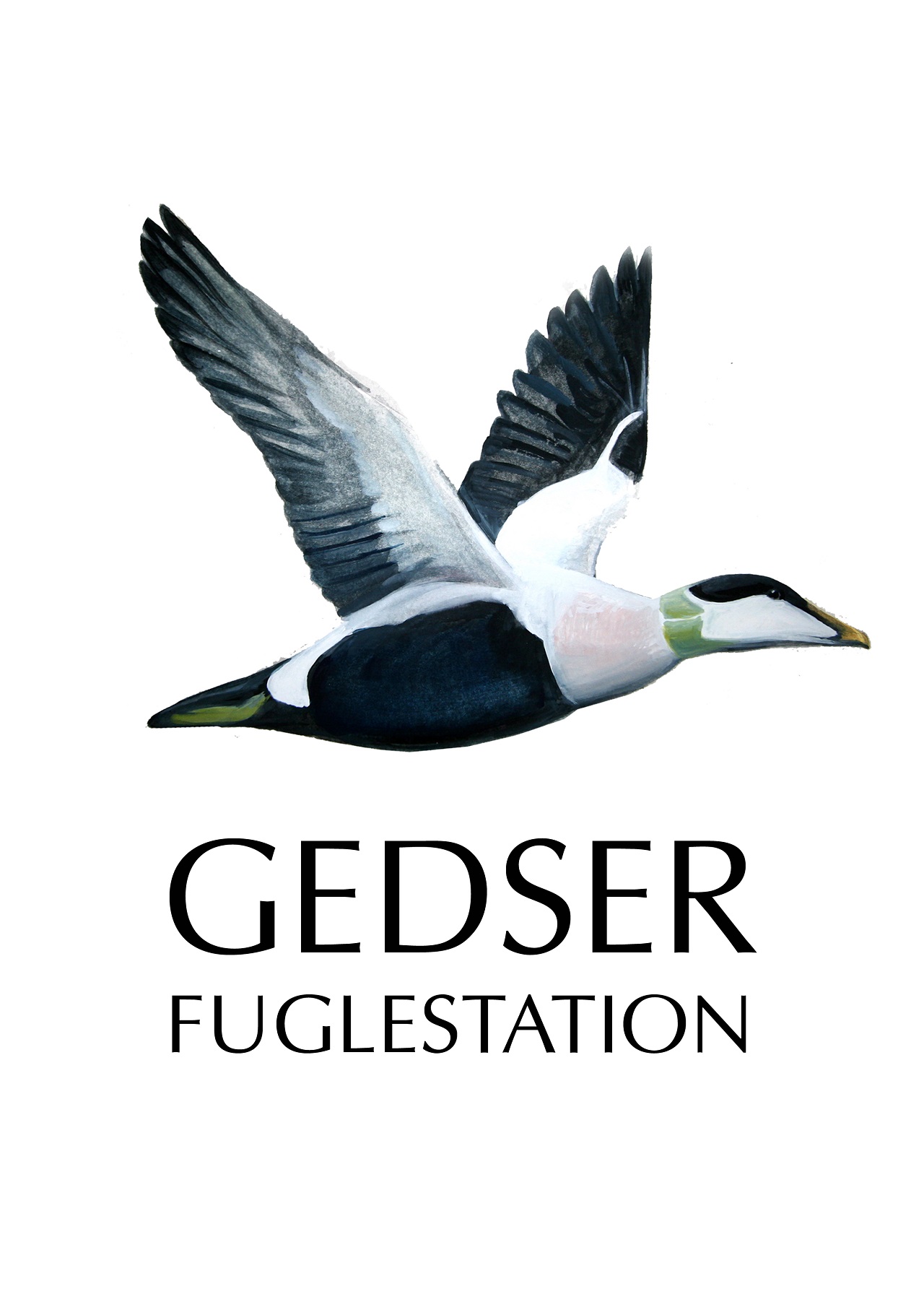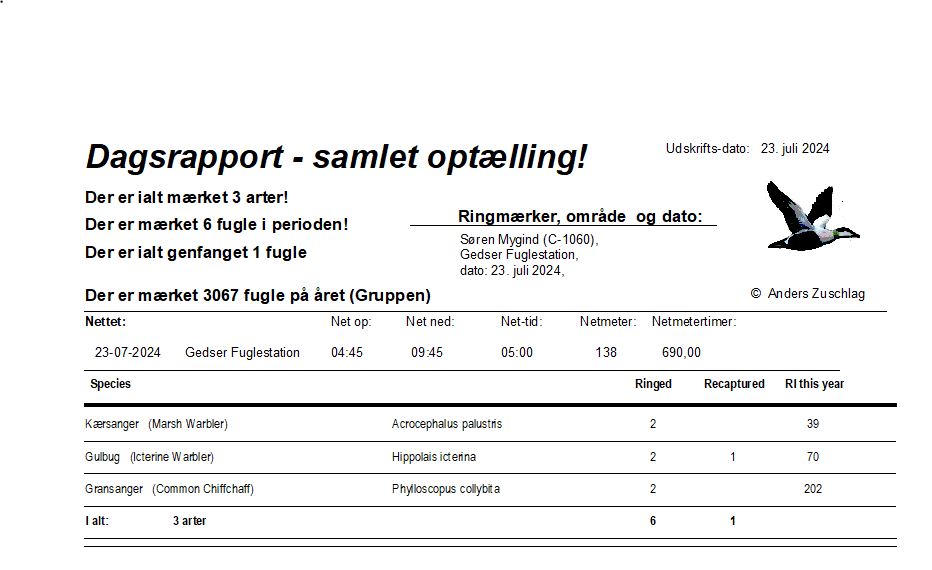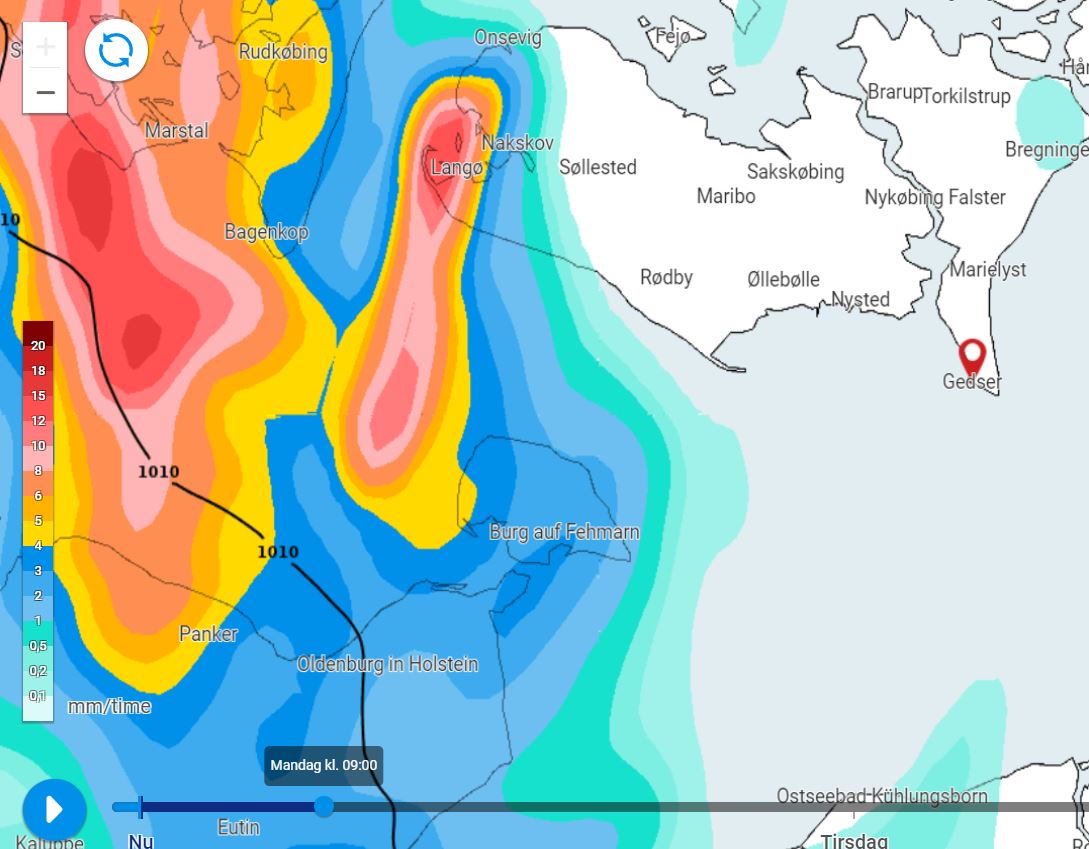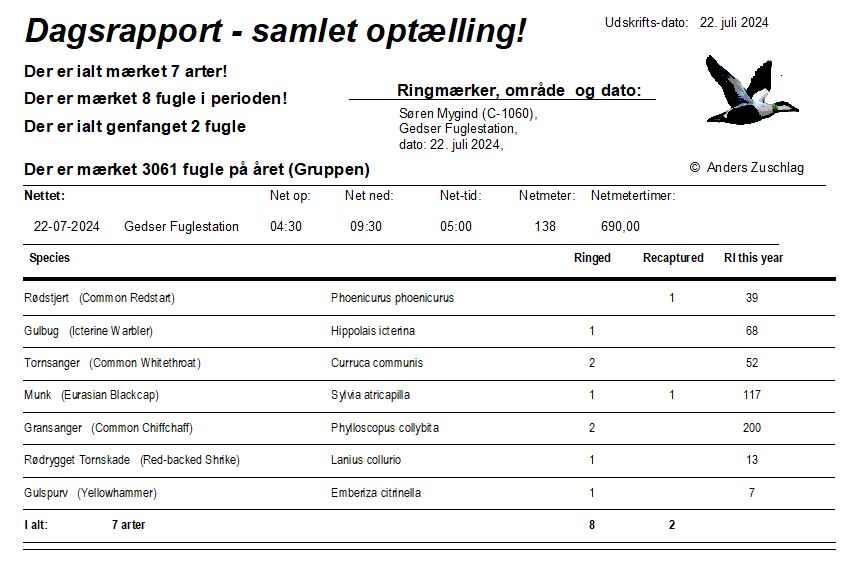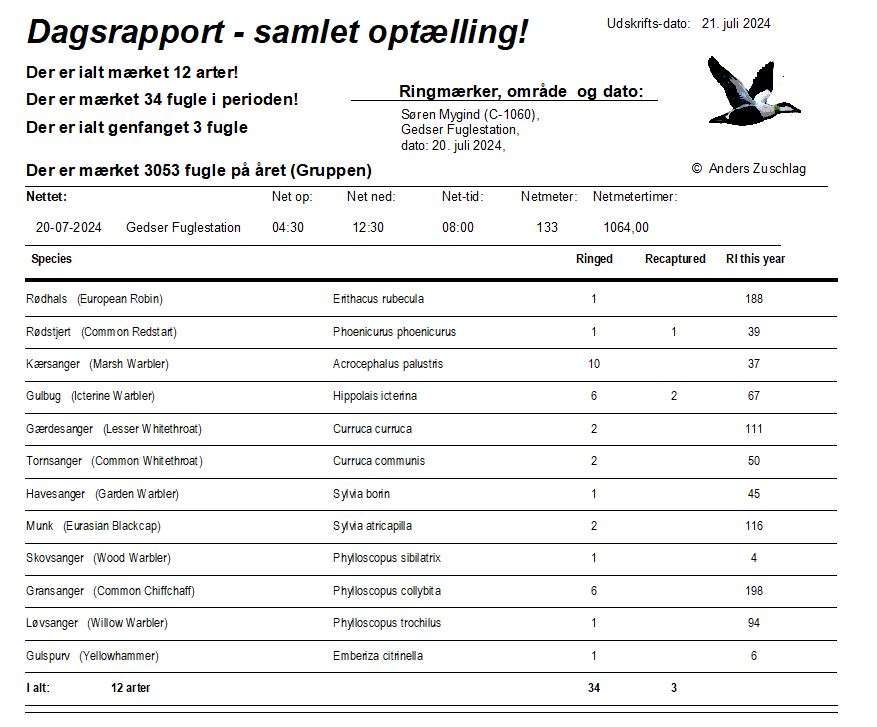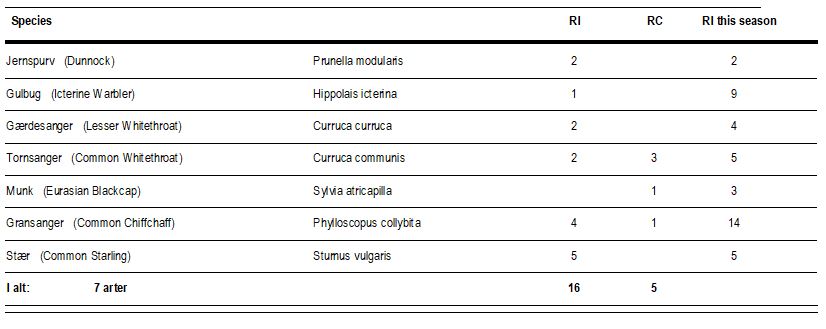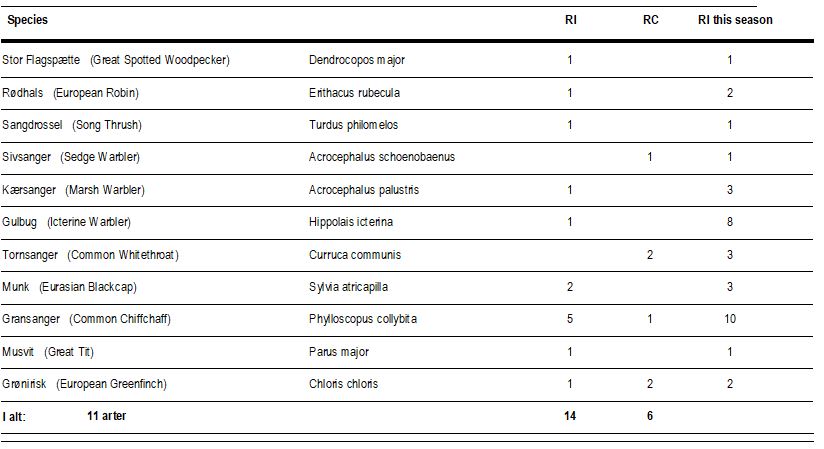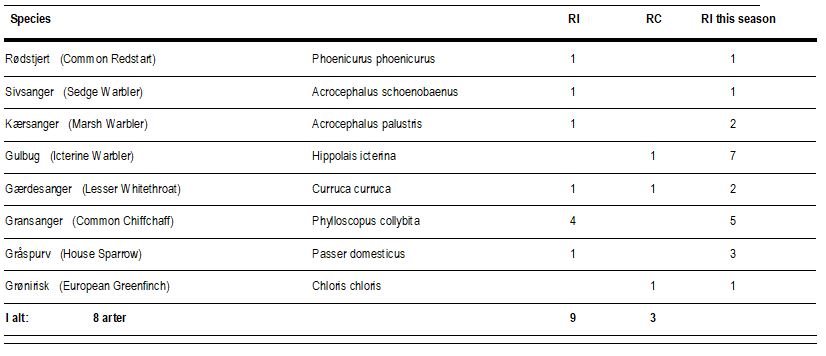Gedser Fuglestation Blog
Her på Gedser Fuglestations blog bringes korte nyheder i dagbogsformat om hændelser på fuglestationen.
Se indlæg fra måned: jan. (10)feb. (18)mar. (31)apr. (26)maj (31)juni (30)juli (23)aug. (31)sept. (30)okt. (31)nov. (30)dec. (20)
En stille og forsigtig dag
Ringmærkningen: Udover, at der selvfølgeligt bliver sat en ring på fuglene bliver fuglene, såvidt muligt, også bestemt til alder og køn samtidigt med at der bliver foretaget målinger af vingelængde, vægt samt størrelsen af fuglens depot af fedt.
Når alderen af en fugl skal bestemmes er det vigtigt med et kendskab til hvornår henholdsvis unge og voksne fugle skifter eller fælder deres fjerdragt og hvor stor en del af fjerdragten der skiftes. Efter at være fløjet fra reden skiften en Gulbug (Hippolais icterina) således kun nogle enkelte fjer på vores breddegrader inden den flyver til overvintringsområdet i Afrika hvor hele fjerdragten udskiftes. Tilsvarende skifter de voksne Gulbuge kun nogle få fjer på vores breddegrader medens hele fjerdragten udskiftes i vinterkvarteret.
Når en Gulbug ankommer til vores breddegrader fra overvintringsområdet er dens fjerdragt derfor slidt medens de unge fugle har en mere frisk fjerdragt, da de ikke har været i Afrika og deres fjerdragt er anlagt for nyligt. Specielt på de fjer der kaldes tertialerne kan denne forskel tydeligt ses, bl.a. fordi tertialerne er blandt de fjer der får mest sollys og derfor slides kraftigt. Tertialerne er de svingfjer, som hæfter til den del af fuglens knogle, som svarer til vores overarm.
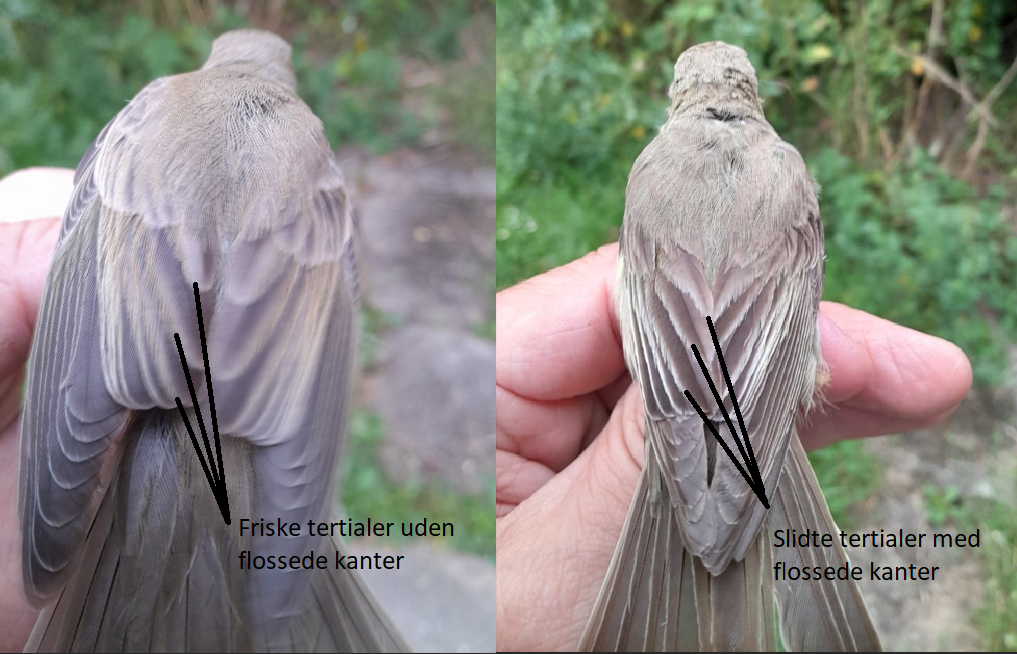
Trækket på Odden: Der kom mindre regn, end meteorologerne havde lagt op til, og det gav mere tørvejr til at opleve et stadig beskedent træk, men med en fin variation af arter. Den slags dage er lige for tiden gode til træning i at bestemme terner, der mest flyver temmelig langt ud over havet og passerer hurtigt.
Denne morgen bød blandt andet på flere Sortterner (Chlidonias niger), som stadig var overvejende i sorte sommerdragter med tydelige hvide undergumper, mere end ti Dværgterner (Sternula albifrons) og pænt med Splitterner (Thalasseus sandvicensis), som har et meget karakteristisk kald. For de to sidst nævnte arter af terner gælder, at der også er lokale fugle, som fouragerer ved Odden, så vi må prøve at skelne mellem trækkende og rastende fugle. Dertil kom lidt træk af Dværgmåger (Hydrocoloeus minutus), hvor de adulte/voksne fugle selv på meget stor afstand er tydeligt sorte på undersiden af vingerne.
I alt blev det til 643 fugle af 27 arter i løbet af standardtidens fem timer.
Se alle dagens observationer på Gedser Odde i DOFbasen.
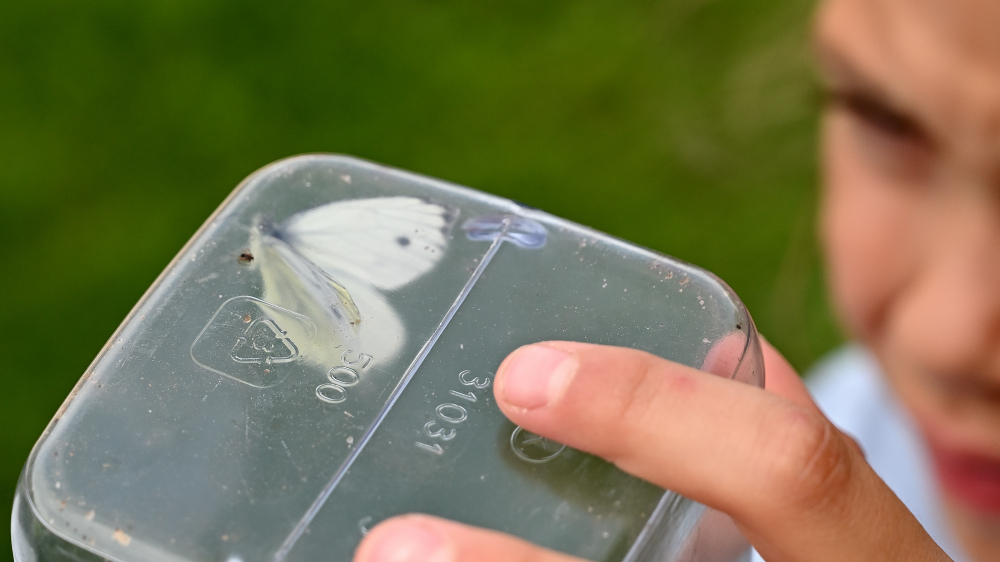
Aktiv Sommer: Tirsdag var fuglestationen med til at lave ’Aktiv Sommer’ for børn i Guldborgsund Kommune. Det foregik i samarbejde med Det Sorte Geomuseum i Gedser og med støtte fra kommunen. Gedser Fuglestation har flere års erfaring med den slags aktiviteter for børn. Frivillige fra fuglestationen forsyner børnene med net, plasticbokse med forstørrelsesglas og andet udstyr til at fange insekter. Børnene bliver sendt af sted for at finde og fange forskellige typer og arter af insekter, som så bliver bestemt af stationens aktive sommerhold. Børnene var søde, ivrige og glade; det var godt at opleve.
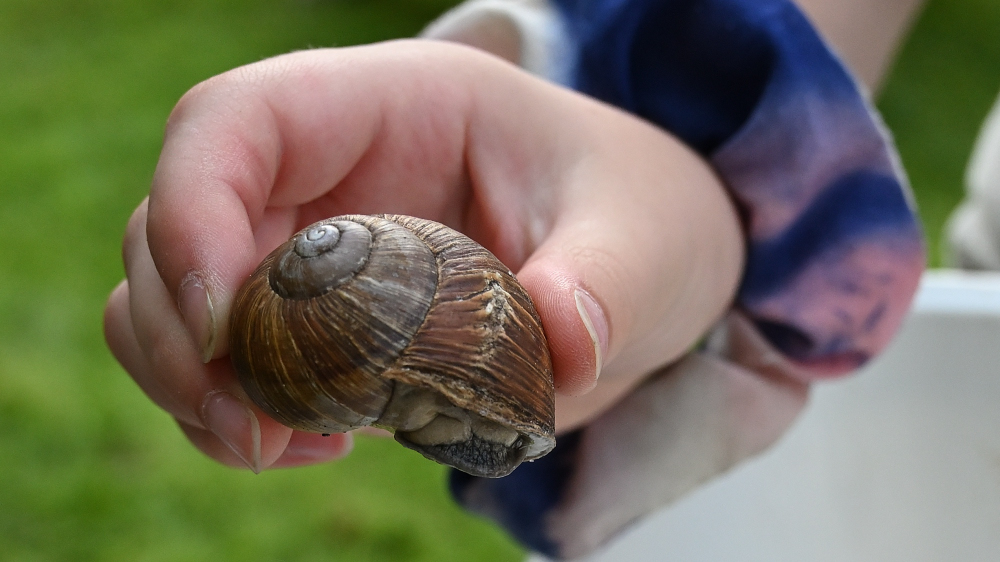
På stationen: Anne Marie Reith, Tina Elley, Mads Elley, Gert Juul Jeppesen, Bo Kayser, Ole Friis Larsen og Søren Mygind.
Tanker om lodsen, ringmærkning og standarddag
Ringmærkningen: Under arbejdet med ringmærkning ser vi ofte lodsbåden sejle forbi, hvilket på en dag med få fugle gav plads til nogle tanker om ligheder mellem lodsens arbejde og ringmærkning.
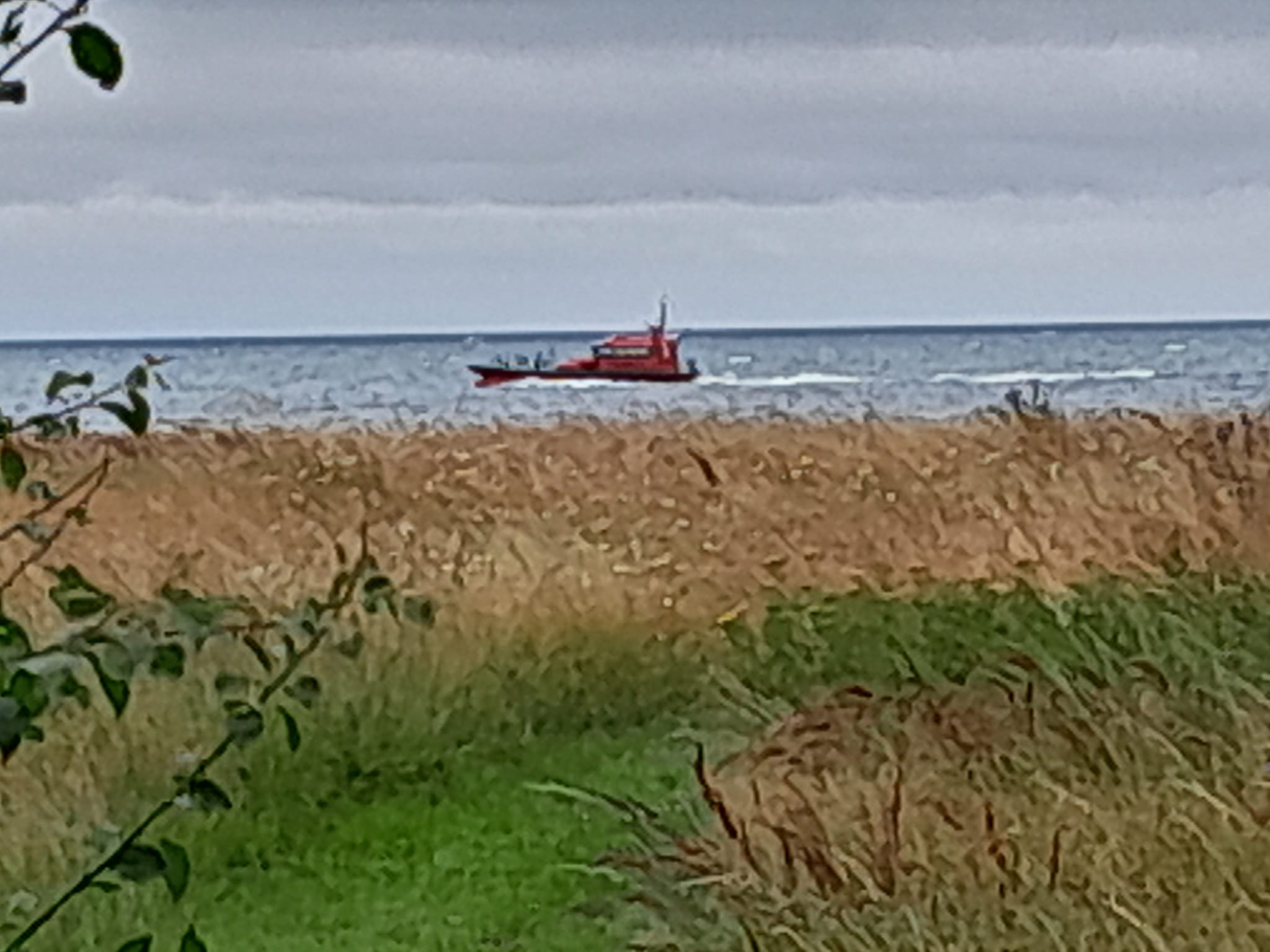 Lodsbåden sejler forbi Gedser Fuglestation
Lodsbåden sejler forbi Gedser Fuglestation
Til en privatfest for nogle år siden mødte jeg en tidligere fisker, som nu arbejdede som skipper på lodsbåden, som vi dagligt ser sejle forbi Gedser Fuglestation. Skipperen på lodsbogen kunne således fortælle at det kostede ca. 80000 kr. at have en lods ombord gennem de indre danske farvande fra Gedser til Skagen. Et umiddelbart stort beløb, men peanuts i mod de økonomisk krav et rederi kan blive mødt af i tilfælde af en grundstødning i danske farvande.
Skipperen kunne samtidigt fortælle om hvor svært det er sejle et 400 m langt skib gennem de danske farvande, hvor det f.eks. kan være umuligt, at nå at rette op og undgå en grundstødning, hvis der blot drejes en grad for meget på roret på det forkerte tidspunkt. Med tanke på de konsekvenser en grundstødning af et stort tankskib kan have for mange havfugle må lodsens arbejde derfor anerkendes.
Under sit arbejde benytter lodsen sig selvfølgeligt af moderne hjælpemidler, så som radar og vejrudsigt hvilket også er tilfældet når man som ringmærker skal gennemføre en standardmærkning på en dag hvor et lavtryk og omslag til vestenvind fører passager af regn mod Gedser. Regn er således altid kritisk ved ringmærkning, da fuglene ikke kan tåle at blive våde medens de sidder i nettene.
Før og under ringmærkningens på en vejrmæssigt udfordrende dag bliver vejrudsigten og vejradaren derfor studeret indgående og flere forskellige scenarier for dagens forløb bliver tænkt igennem. I dag var det således kritisk om ringmærkning kunne gennemføres i standardtiden fra kl. 4.30 til 9.30 inden det nedbørsområde, som ses nedenfor ville ramme Gedser.
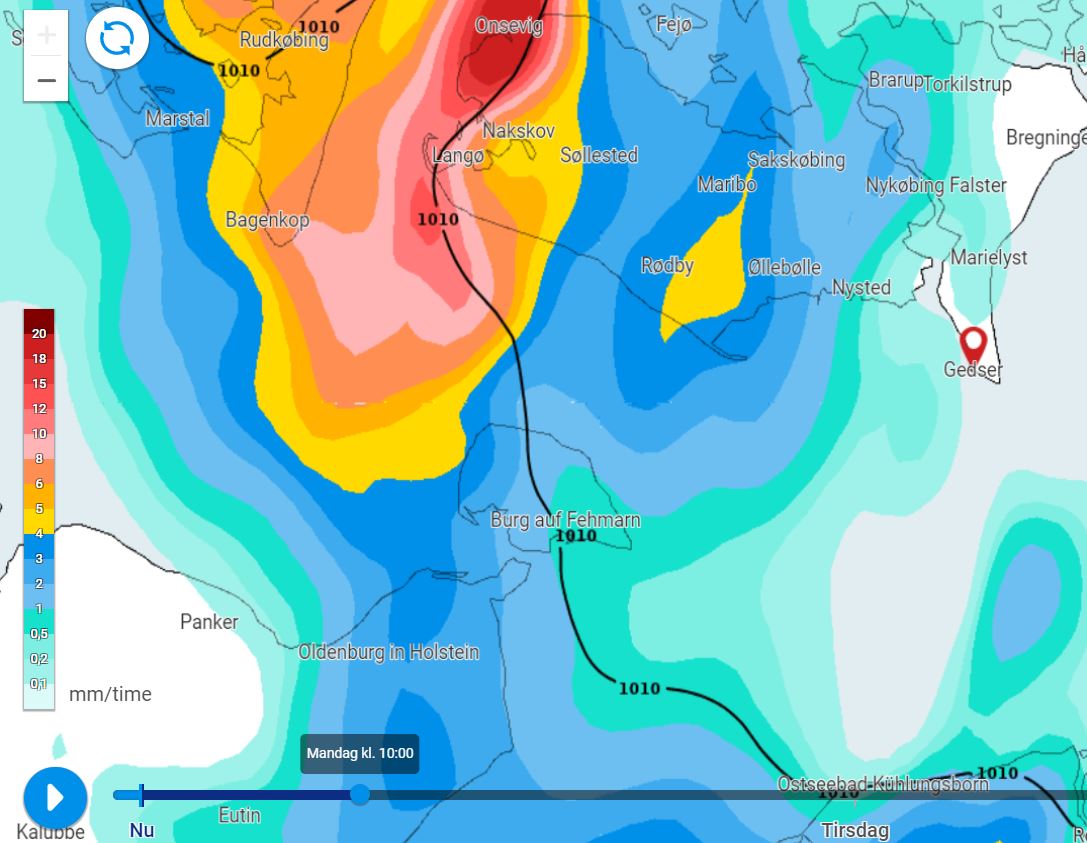
I dag lykkedes det nærmeste til perfektion. I perioden fra kl. 9.00 til 9.30 medens det var tørvejr, blev der konstant runderet ved nettene og der var derfor ingen fugle i nettene kl. 9.30 hvor den beskedne mængde net (138 nm) kunne klappes sammen på 14 minutter, så de ikke fangede flere fugle. Efterfølgende blev nettene lukket helt på 22 minutter medens regnen tog til, men standarddagen var hjemme!
Nogle vil måske spørge hvorfor der er så meget fokus på at opnå en standarddag hvor der fanges fugle med minimum 60 meter net fra en halv time før solopgang og fem timer frem. Svaret herpå er at standarddagene danner udgangspunkt for den sammenligning vi foretager af antallet af fangede fugle fra år til år, som er blevet foretaget ved Gedser Fuglestation i mere end 20 år. Og for at få så repræsentativ en indsamling af data er det derfor vigtigt at vi får gennemført en standarddag når det er muligt.
De fleste af de fugle vi mærker i øjeblikket er formodentligt lokale ynglefugle og deres unger. Flere af de gamle fugle er således i gang med at skifte deres fjerdragt og har generelt ikke meget fedt på kroppen. De manglende fedtdepoter og den ufærdige fjerdragt viser således, at de endnu ikke er klar til trækket sydpå.
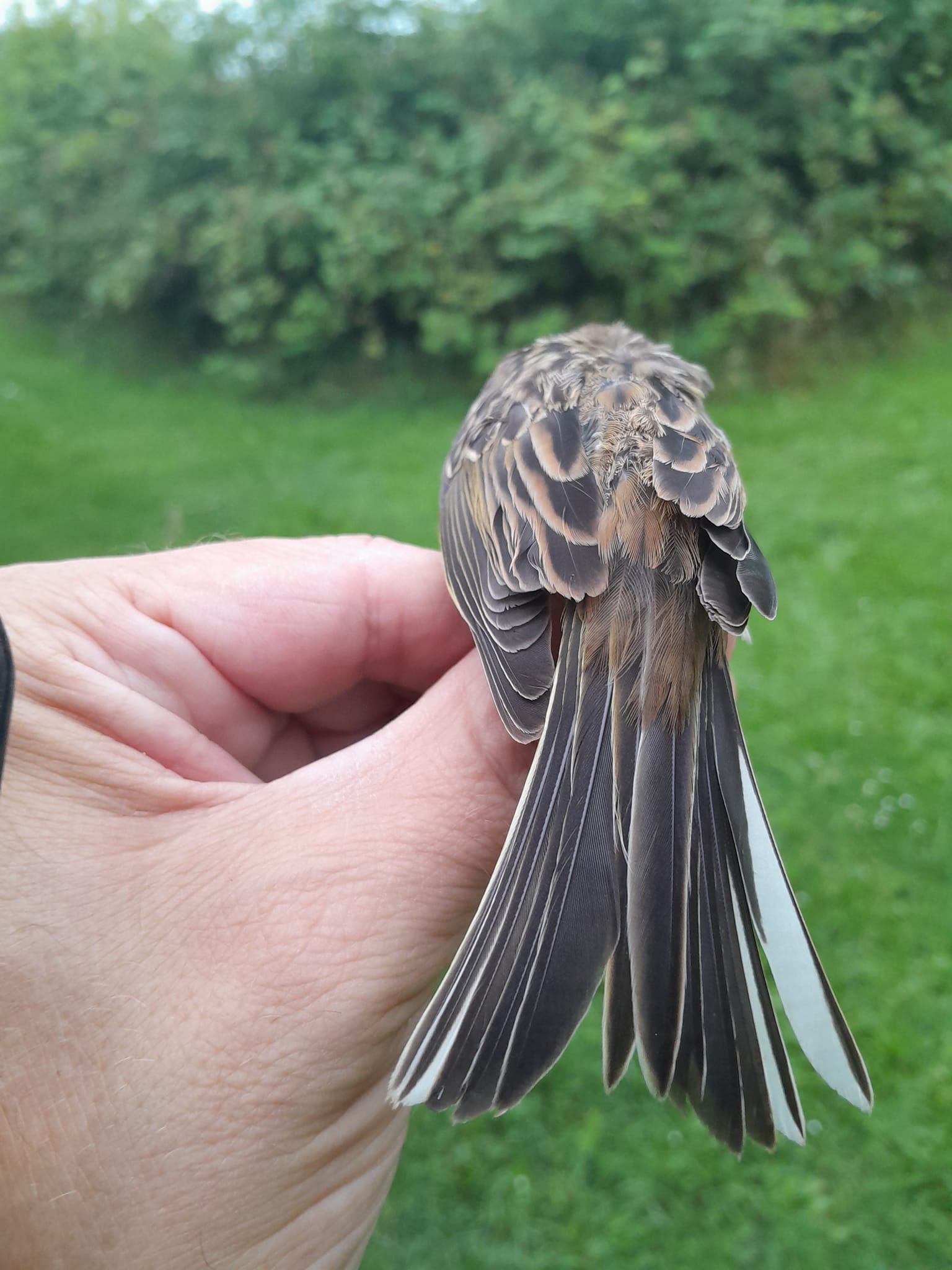 En ung (1 k) Gulspurv (Emberiza citrinella). De relativt spidse halefjer og de sorte striber på bryst og kind viser det er en ung fugl. Gulspurven trækker normalt først senere på året og det må derfor antages at fuglen er unge af et lokalt ynglepar og ikke en trækfugl.
En ung (1 k) Gulspurv (Emberiza citrinella). De relativt spidse halefjer og de sorte striber på bryst og kind viser det er en ung fugl. Gulspurven trækker normalt først senere på året og det må derfor antages at fuglen er unge af et lokalt ynglepar og ikke en trækfugl.
Trækket på Odden: Forandringer i vejret bliver næsten altid anset for en sikker tommelfingerregel om forandringer i trækket – mest i forhåbning om flere fugle – men sådan var det ikke mandag. Vejrudsigten bød på skyer og noget regn samt en anden vindretning i forhold til den sommerlige søndag, og det tætte skydække var der, men radarbilledet over regnområder tydede på, at vi ville kunne klare såvel de fem timers ringmærkning som de fem timers træktælling i tørvejr; det blev kun til lidt drypperi og nogle få minutters egentlig regn. Vinden kom let fra øst med 2,6 meter i sekundet og faldt helt ned til nul, hvorefter der kom en ny vind fra vest, som tog til i styrke op til 7,7 meter i sekundet, men fuglemæssigt kom der ikke til at ske meget.
Trækket ved Odden løb op i 365 fugle af 35 arter, hvoraf trækket af Hættemåger (Chroicocephalus ridibundus) var det største med lidt over hundrede fugle og mest bemærkelsesværdige med cirka en tredjedel unge Hættemåger. Det tyder på god ynglesucces, efter at ynglekolonierne i det seneste par år har været hårdt ramt af fugleinfluenza.
Se alle dagens observationer ved Gedser Odde i DOFbasen.
På stationen: Ole Friis Larsen og Søren Mygind.
En stille dag
Efter den fine start i går blev det en mere stille dag i dag med kun det halve antal mærkninger til trods for at der i dag blev åbnet for 100 m net mere. Det faldende antal fugle er dog helt i tråd med, at antallet af fugle ofte aftager i perioder med stabilt vejr, som i øjeblikket er præget af fint sommervejr med vind fra øst. Ofte indtræffer de store antal af fugle således i forbindelse med at vejret skifter.
Allerede nu kan jeg dog se at himlen ikke længere er klart blå og det er begyndt at blæse lidt op. Samtidigt lover vejrudsigten, at vinden i nat vil dreje over i nord øst og senere i nord vest. Så det kan være at det kan sætte gang i nogle fugle i morgen. Omvendt kan vejrskiftet også betyde, at der kommer regn så nettene måske ikke kan åbnes. Så alt i alt spændende hvad morgendagen bringer.
Trækket på Odden: En smuk sommermorgen med blå himmel, sol og en let vind fra øst over havet bød både på godt selskab ved trækobservationsposten på hele Nordens sydligste punkt og et fint lille træk uden store tal, men med god variation i arterne. Ofte er det en overraskelse for folk på Odden, at der allerede står folk på Odden for at se på ’efterårstræk’, men mange arter er allerede på vej sydover.
Vores kolleger ved Blåvand Fuglestation har allerede talt over 6.000 vadefugle på træk ned langs den jyske vestkyst. Det kan vi ikke hamle op med ved Gedser Odde, men søndag gav alligevel en smagsprøve med måske især et halvt hundrede Små Kobbersnepper (Limosa lapponica), over 30 Småspover (Numenius phaeopus) og et par Stenvendere (Arenaria interpres).
Mere end 150 af de små Krikænder (Anas crecca) var også et fint syn over vandet sammen med flere arter af terner. Fra land er det værd at bemærke to Tårnfalke (Falco tinnunculus), som trak ud over havet mod syd. Det var unge fugle fra i år (1k, første kalenderår), som næsten kun lige er fløjet fra rederne, før de løsriver sig og begynder at strejfe omkring. Måske var der en tredje, som forsøgte sig, men hurtigt kom tilbage. Se alle dagens observationer fra Gedser Odde i DOFbasen.
På stationen: Ole Friis Larsen og Søren Mygind
En fin start
Det er altid med stor spænding at en ny sæson startes op og i år var ingen undtagelse. For ikke at blive overasket af en meget stort antal fugle og for at have tid til at kikke godt på fuglene, så kriterierne for køns og alders bestemmelse kan øves havde jeg bestemt mig for kun at åbne 133 meter net.
Fra morgenstunden var der pænt med fugle og specielt Kærsangerne (Acrocephalus palustris) forekom i et for arten pænt antal. I alt 10 fugle blev mærket heraf 8 voksne fugle og 2 ungfugle. Ved voksne fugle forstås fugle, som er i deres andet kalenderår eller ældre (2k+) medens der ved ungfugle forstås fugle, som er i deres første kalnderår (1k). De voksne fugle havde generelt væsentligt større fedtdepoter end de unge og er derfor i øjeblikket mere klar til efterårstrækket end de unge. Billedet herunder viser en 1 k Kærsanger.
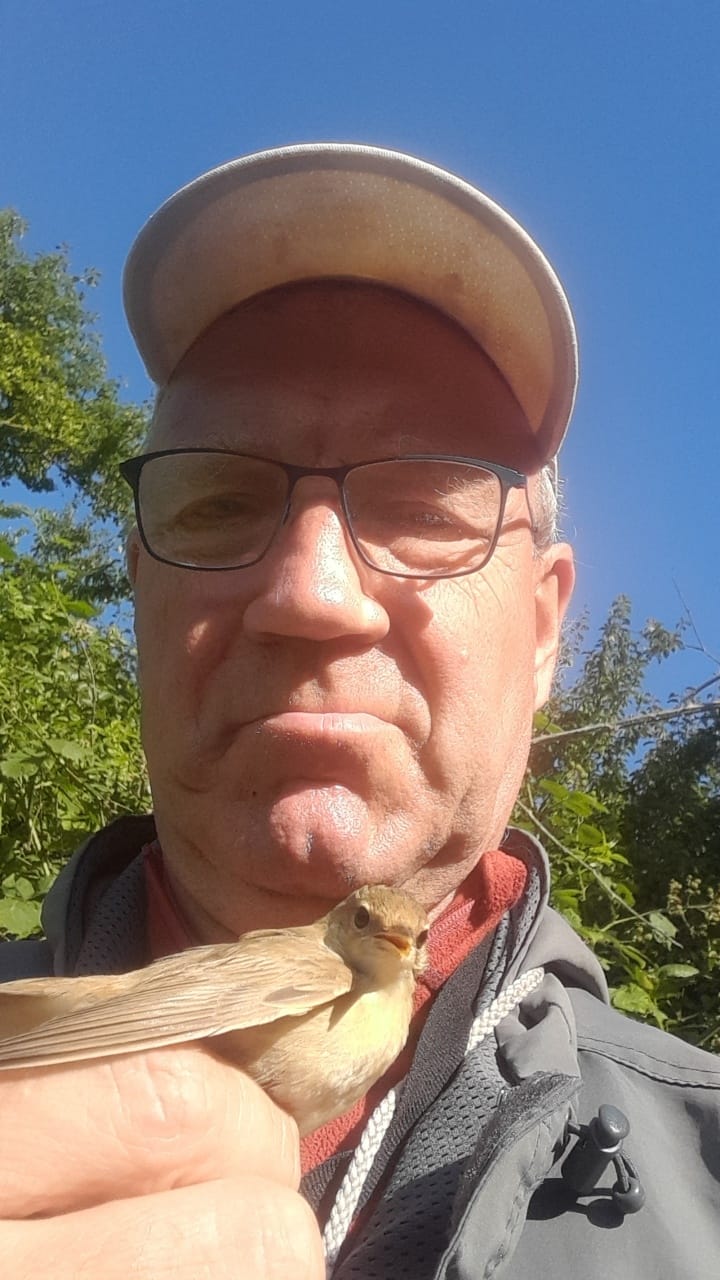 Ung (1 k) Kærsanger.
Ung (1 k) Kærsanger.
Ved mærkning først på sæsonen sker det ofte at vi fanger unger af lokale ynglefugle, som er i deres juvenile dragt, som kan afvige noget fra den dragt som ungfuglene fælder til inden for de første måneder af deres liv. Et godt eksempel herpå er den juvenile Rødhals (Erithacus rubecula), som ses på billedet nedenfor.
 Ung 1 k Rødhals, som endnu er i den juvenille dragt.
Ung 1 k Rødhals, som endnu er i den juvenille dragt.
Som ringmærker er det naturligvis spændende at mærke en ny art, hvilket skete for mig i dag da en fin ung Skovsanger (Phylloscopus sibilatrix) røg i nettet. Allerede da fuglen sad i nettet var den fine silkeagtige lyse underside i kontrast til det gullige bryst tydelig. Efterfølgende viste målinger i laboratoriet at Skovsangeren med sine 9,7 gram er væsentligt tungere end en Løvsanger (Phylloscopus trochilus), som typisk vejer omkring 7 gram. Samtidigt skulle Skovsangeren have en såkaldt 9a ring, som blandt andet også anvendes til Rødhalse medens Løvsangeren får en F-ring, der har fået deres navne fordi de anvendes til Fuglekonger (Regulus regulus), som er Europas mindste fugl. Så på alle måder fremstod Skovsangeren som Phylloscopusernes maskuline bodybuilder type, om end den sagde farvel til mig med et meget fint og blødt kald.

Ung (1k) Skovsanger
Så alt i alt en fin start på sæsonen.
På stationen: Ole Friis Larsen og Søren Mygind
Karmindompap, Sørgekåbe and Brombær-dverg
So this is a farewell blog – but I will be back for sure! But for now, it is my last blog, it was a nice time in Gedser with not so many birds as expected, therefore many new moths which was not expected at all and which was a very nice thing to learn.
After this place being home for two month, it feels a bit weird to go, but it will also be good to maybe sleep a little longer than before sunrise for a while. My Great-grandmother always said, when I was little and did not want to leave “if you don´t leave, you can´t come back!” A bit of a stupid verdict – don´t know if it really ever convinced me, but there is fore sure some truth in it ;-)
There were some nice goodby-species, two Common Rosefinches “Karmindompap”, a Camberwell Beauty “Sørgekåbe” and also two new moth species. A nice moth with a nice Danish name is Meganola albula “Brombærdværg”. But let´s get to the usual elements of the blog which are…
The ringing:
The weather forecast did not look so good for today. From 06:00 on rain, at 07:00 it should be 11mm! Well, there was some cleaning and so on to do, a bit sad but maybe not to bad for today. So when it came close to that time and a slight rain began, I started to close. But the rain did not really come… I could open again which I did in the end. Karen also came down from upstairs, she, too, had expected rain in the morning and was not sure about her plans now. There were some birds to show and we decided, it would be nice to do one more round than “standart”.
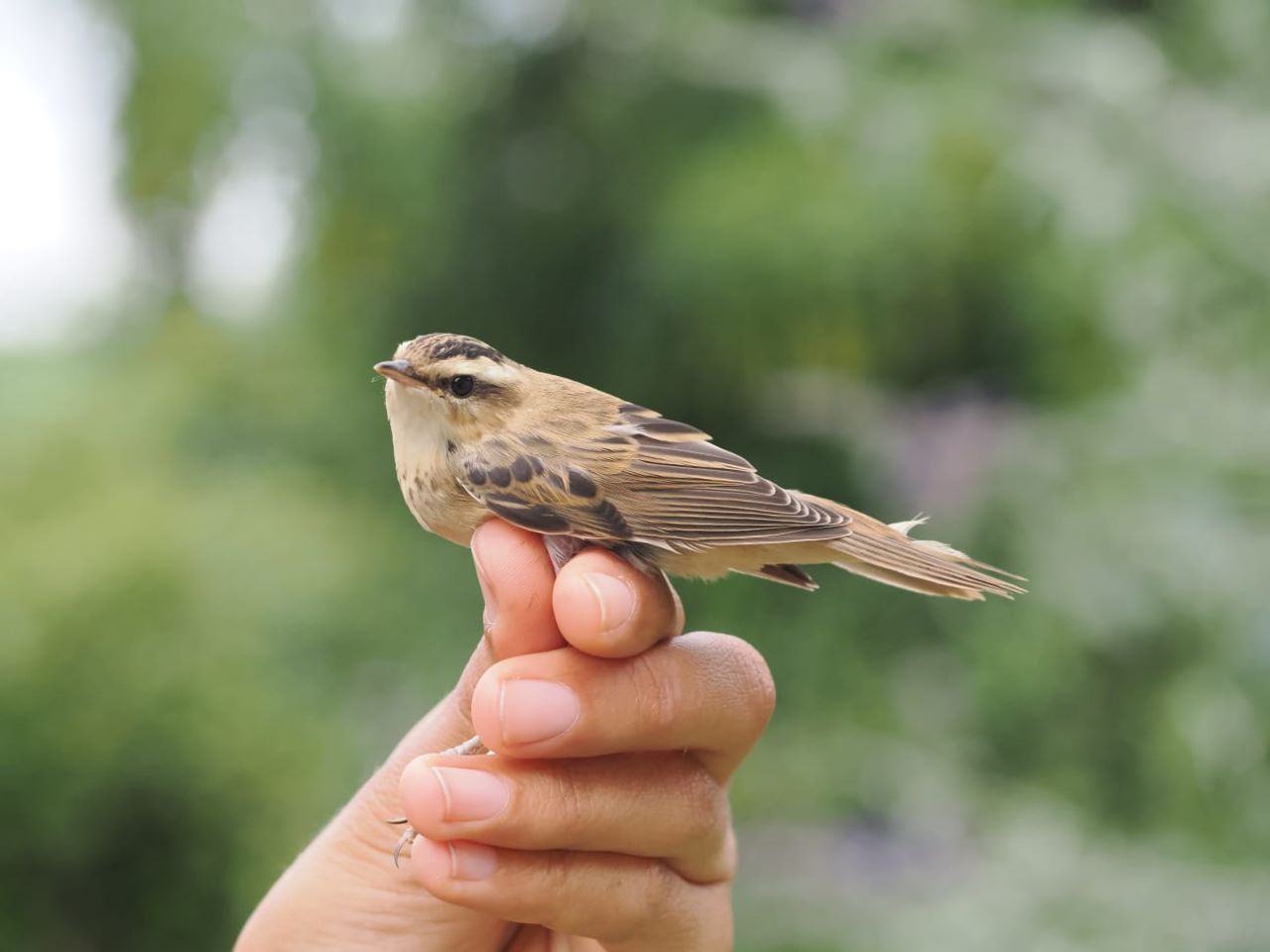 Sedge Warbler "Sivsanger"
Sedge Warbler "Sivsanger"
But this was a zero round, I should have closed. In the final closing round, it turned out, that it was good, that I had not closed before. I got two Common Rosefinches "Karmindompap"!
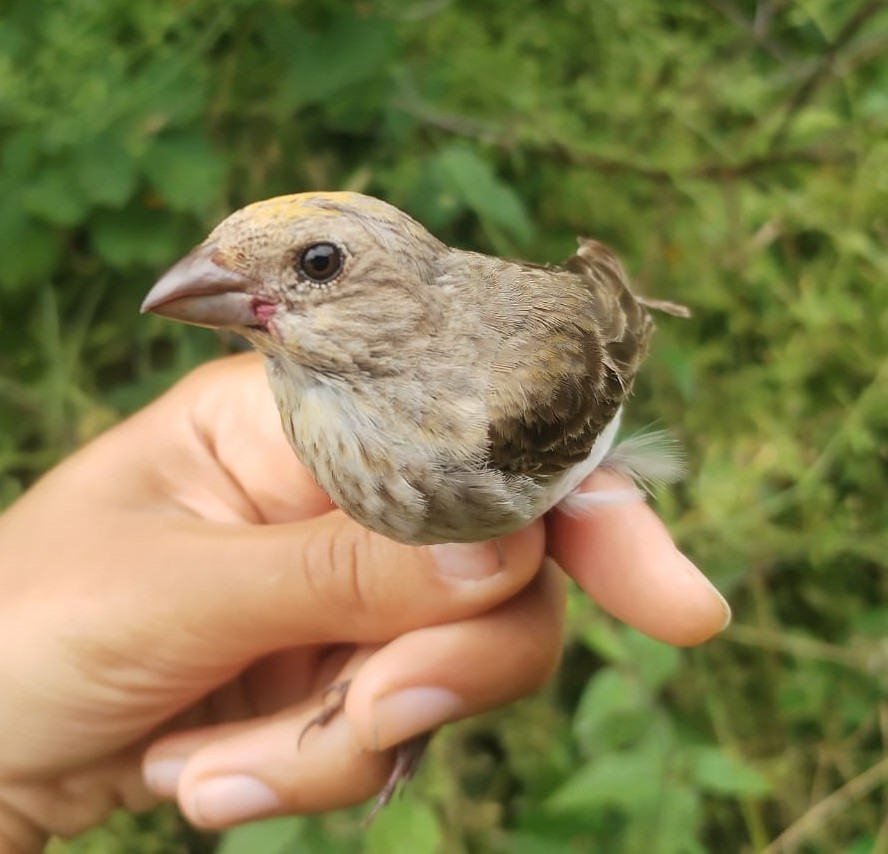 Common Rosefinch "Karmindompap"!
Common Rosefinch "Karmindompap"!
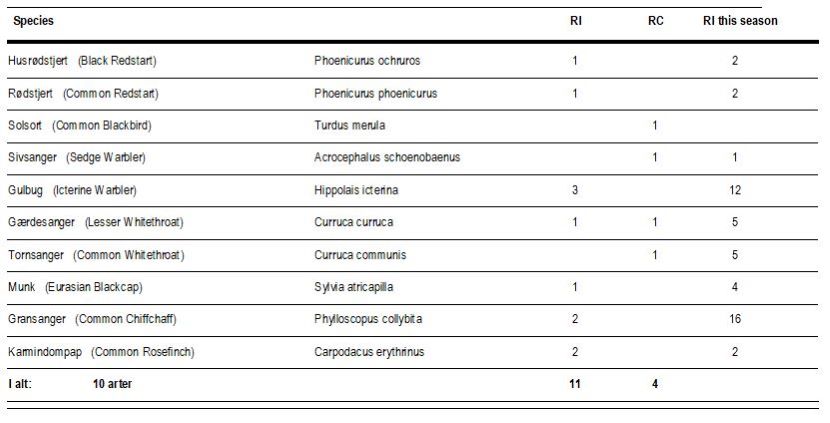 After ringing, I went to do the moth and put away the moth trap, which was a bit sad, because I do not have my own, but sugar wine and building my own are planned. When I passed Karen at the house who was also packing, because she was leaving in the early afternoon, I said “Would be nice, if the “Sørgekåbe” would turn up again." I had seen it briefly on one of my rounds yesterday but would have preferred to see it better but Karen and Hans had seen it very well in the afternoon yesterday in the garden. The what? I had mixed the Danish name a bit up, but shortly after, we got the right name and Karen said suddenly just after “but there it is”. And pointed at the butterfly, I was standing with the back to it. She also had just noticed it the moment I mentioned it. What a nice coincidence!
After ringing, I went to do the moth and put away the moth trap, which was a bit sad, because I do not have my own, but sugar wine and building my own are planned. When I passed Karen at the house who was also packing, because she was leaving in the early afternoon, I said “Would be nice, if the “Sørgekåbe” would turn up again." I had seen it briefly on one of my rounds yesterday but would have preferred to see it better but Karen and Hans had seen it very well in the afternoon yesterday in the garden. The what? I had mixed the Danish name a bit up, but shortly after, we got the right name and Karen said suddenly just after “but there it is”. And pointed at the butterfly, I was standing with the back to it. She also had just noticed it the moment I mentioned it. What a nice coincidence!
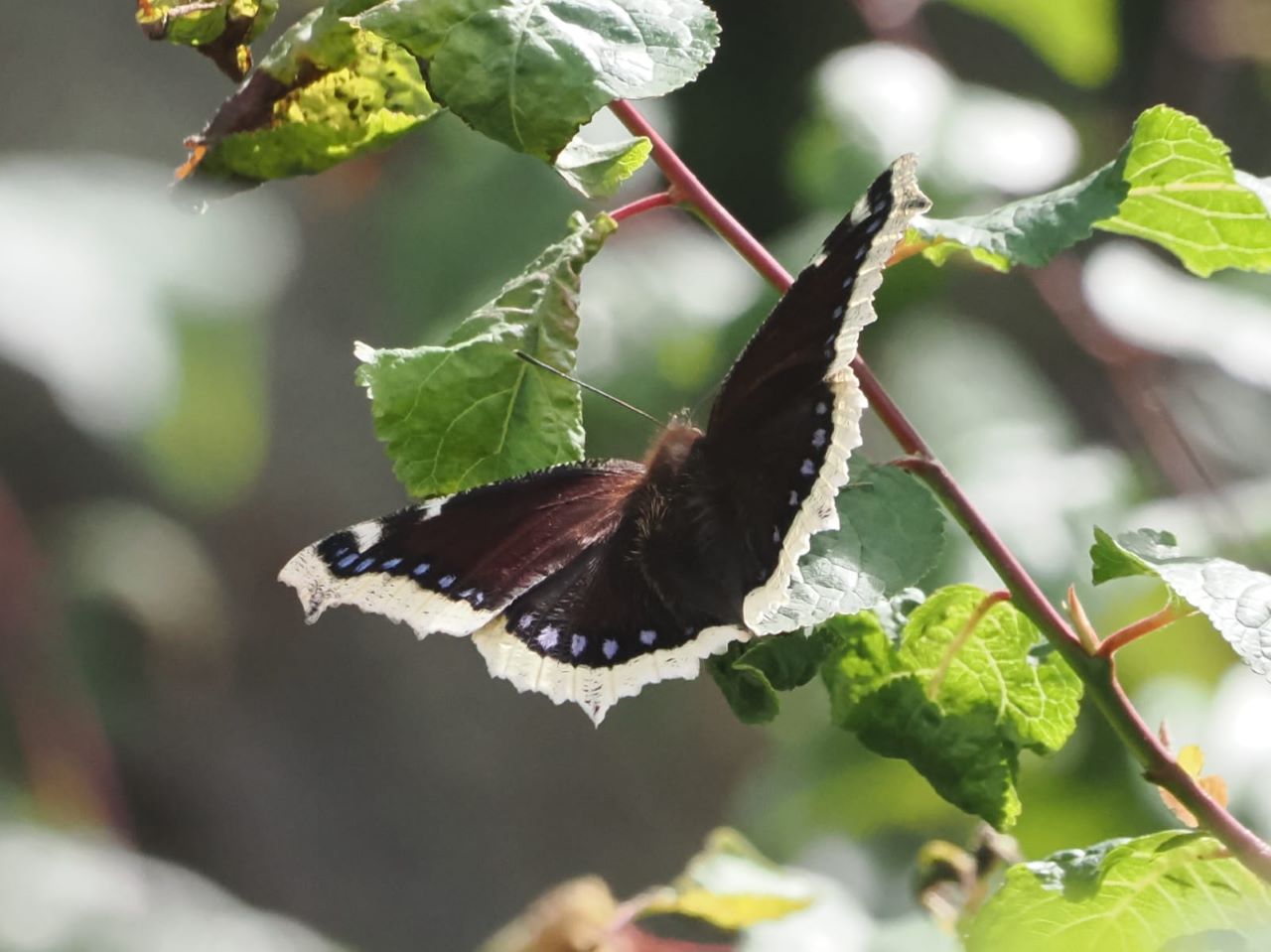 Camberwell Beauty “Sørgekåbe”
Camberwell Beauty “Sørgekåbe”
The moths:
Not so many but some moth today, and two new, Mengola albula “Brombær-dværg and Acrobasis marmorea.
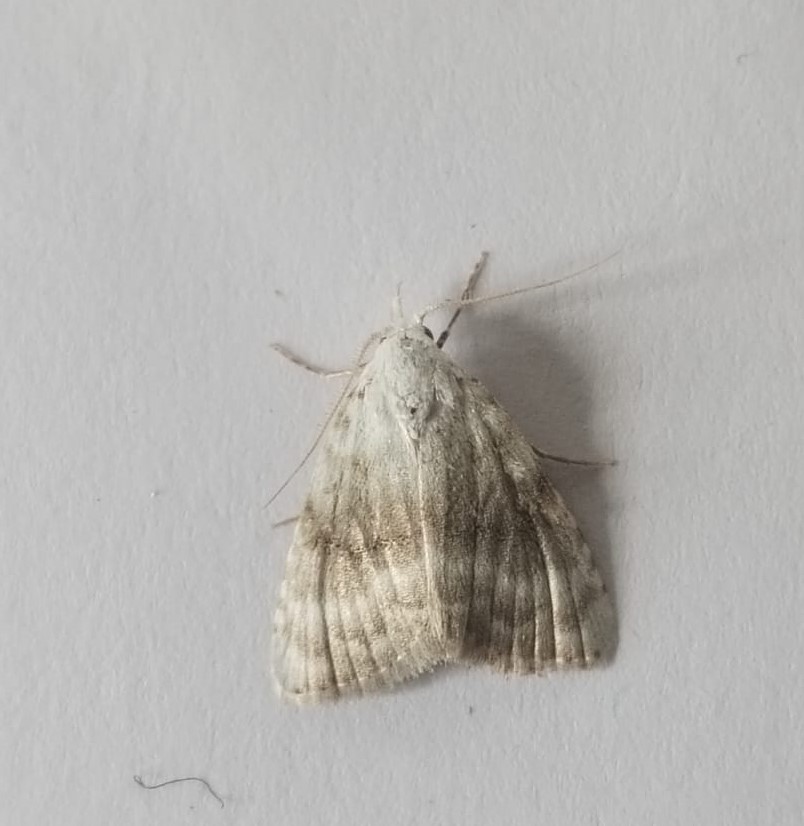 Mengola albula “Brombær-dværg
Mengola albula “Brombær-dværg
Else, not so much special, it is already late, I wasn´t so good in packing and cleaning today, so there is still something to do… But I will do the moth list first, tomorrow morning won´t be time for that before I will leave.
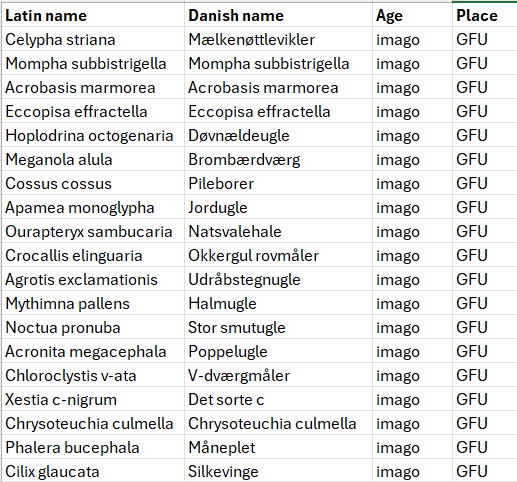
In the evening, Jasper came to the station and we had a nice dinner together.
Bye, bye and best regards for this time,
Hanelie
På stationen: Hanelie Sidhu, Jasper Mosman, our guest Karen Koefoed
Starlings
The ringing:
16 new birds and 5 recaptures today, that is the biggest number we had since the 28th of May, were we caught 17 new birds but no recaps, so actually, today was even better. The highlights were two first calendar year Dunnocks “Jernspurv”. Other ringers would not describe that as a highlight, but I was quite happy when I found some birds in the high net: I told you already yesterday, I observed flocks of Starlings “Stær” flying over the garden. Today, a little flock of eight birds was hanging high in the net. Unfortunately, when I took it down, three managed to fly off, but I still got 5 juvenile birds, which are already beginning with their post juvenile moult, so soon, it will be pretty black-greenish blue shimmering birds with white spots although I also don’t mind their brown juvenile plumage. Let´s hope, the rising bird numbers are a good sign for the coming autumn season and numbers will grow from day to day from now on, and Gedsers autumn ringers will have a busier job than we had in spring!
Karen joined me for the first rounds today to see the ringing and took some good pictures. This was very welcome; it is always easier to be two for taking good bird pictures.
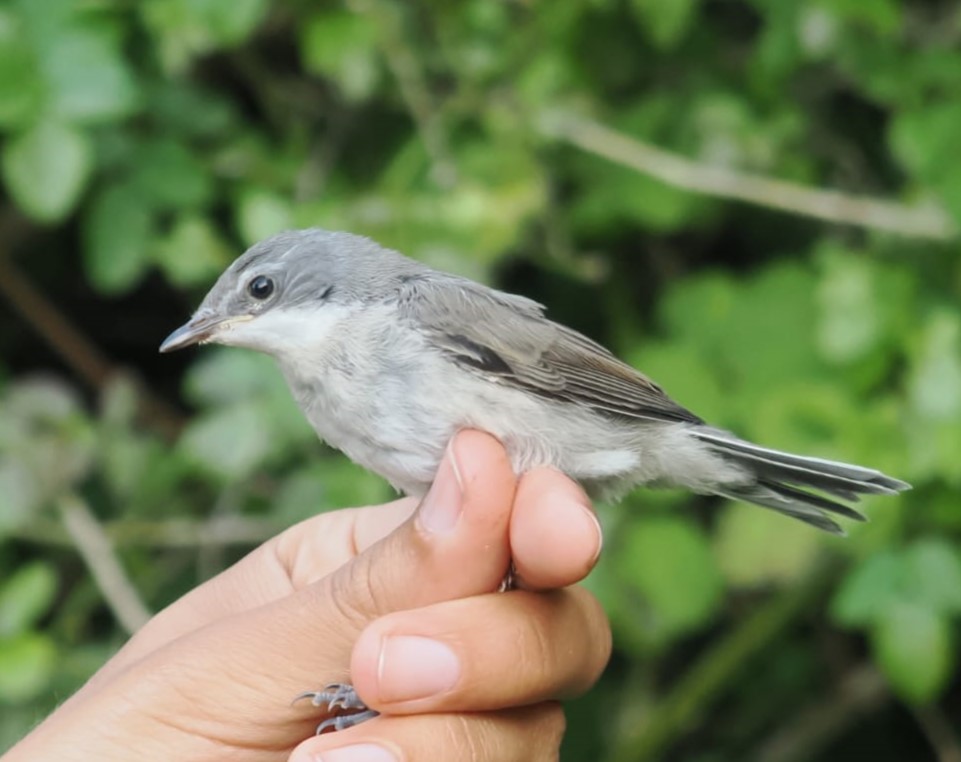 First calendar year Lesser Whitethroat "Gærdesanger", Photo: Karen Koefoed
First calendar year Lesser Whitethroat "Gærdesanger", Photo: Karen Koefoed
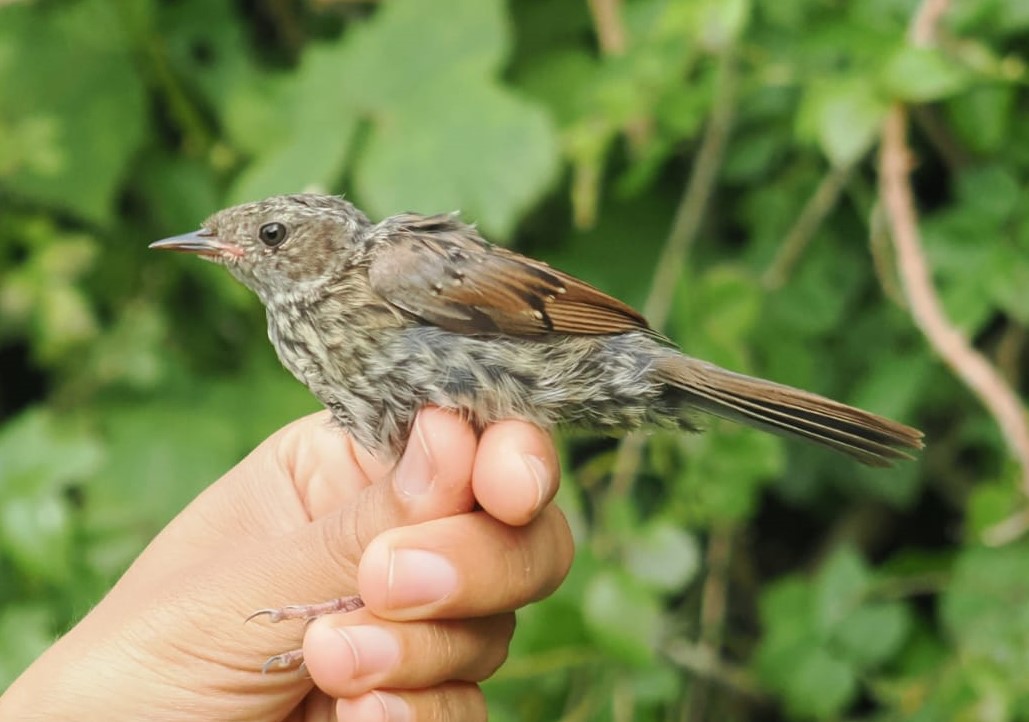 First calendar year Dunnock "Jernspurv", Photo: Karen Koefoed
First calendar year Dunnock "Jernspurv", Photo: Karen Koefoed
The moths:
A nice moth species is definitely Pterosoma palpina “Palpetandspinder”, I think from the front, with its long kind of snout it seems to smile and looks very trusty. After taking it out of the jar, it fell on the paper like dead and I felt a bit bad, until it hanged on my index finger, so I did some of moth with it on one finger. My other favourite today was a very colourful micro moth, Batia lunaris.
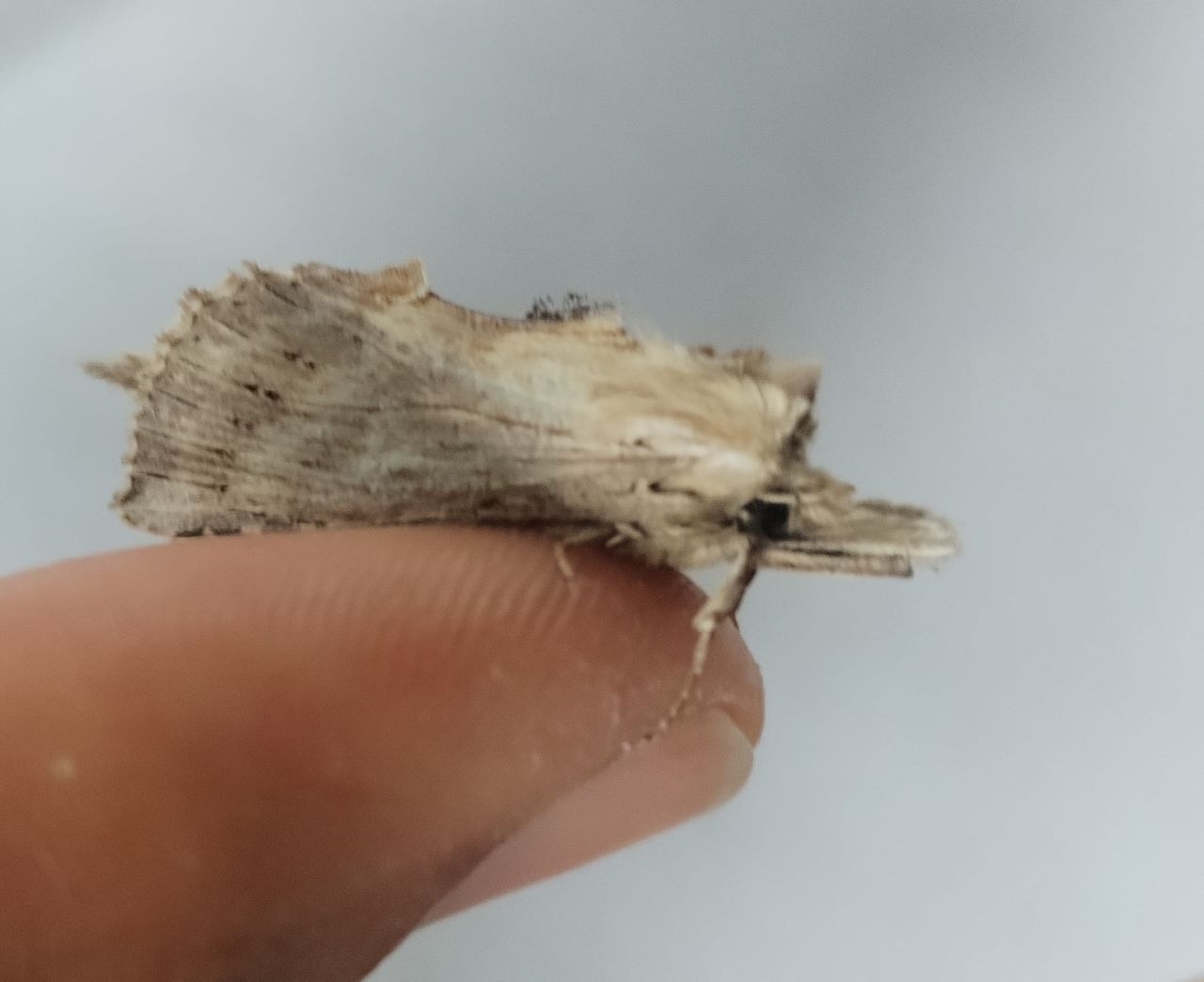 Pterosoma palpina “Palpetandspinder”
Pterosoma palpina “Palpetandspinder”
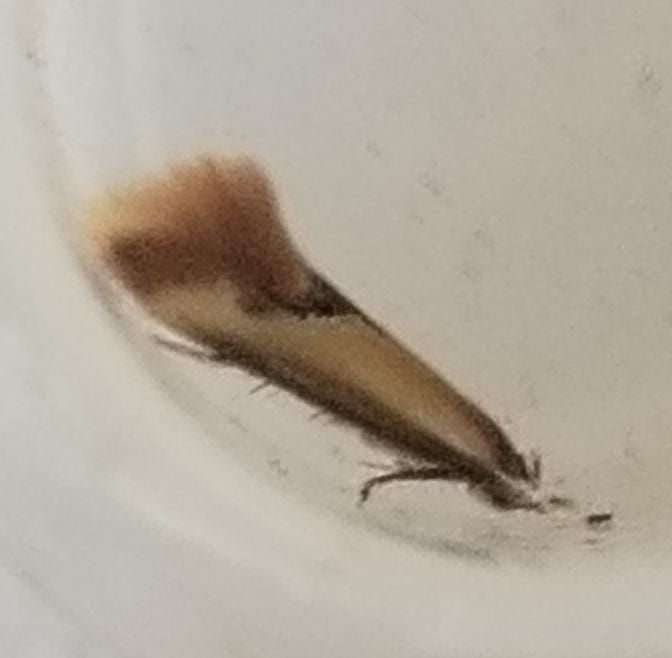 Batia lunaris
Batia lunaris
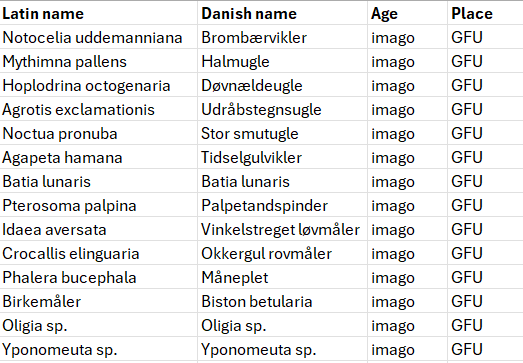
På stationen: Hanelie Sidhu and guest Karen Koefoed
Is this the beginning of autumn migration?
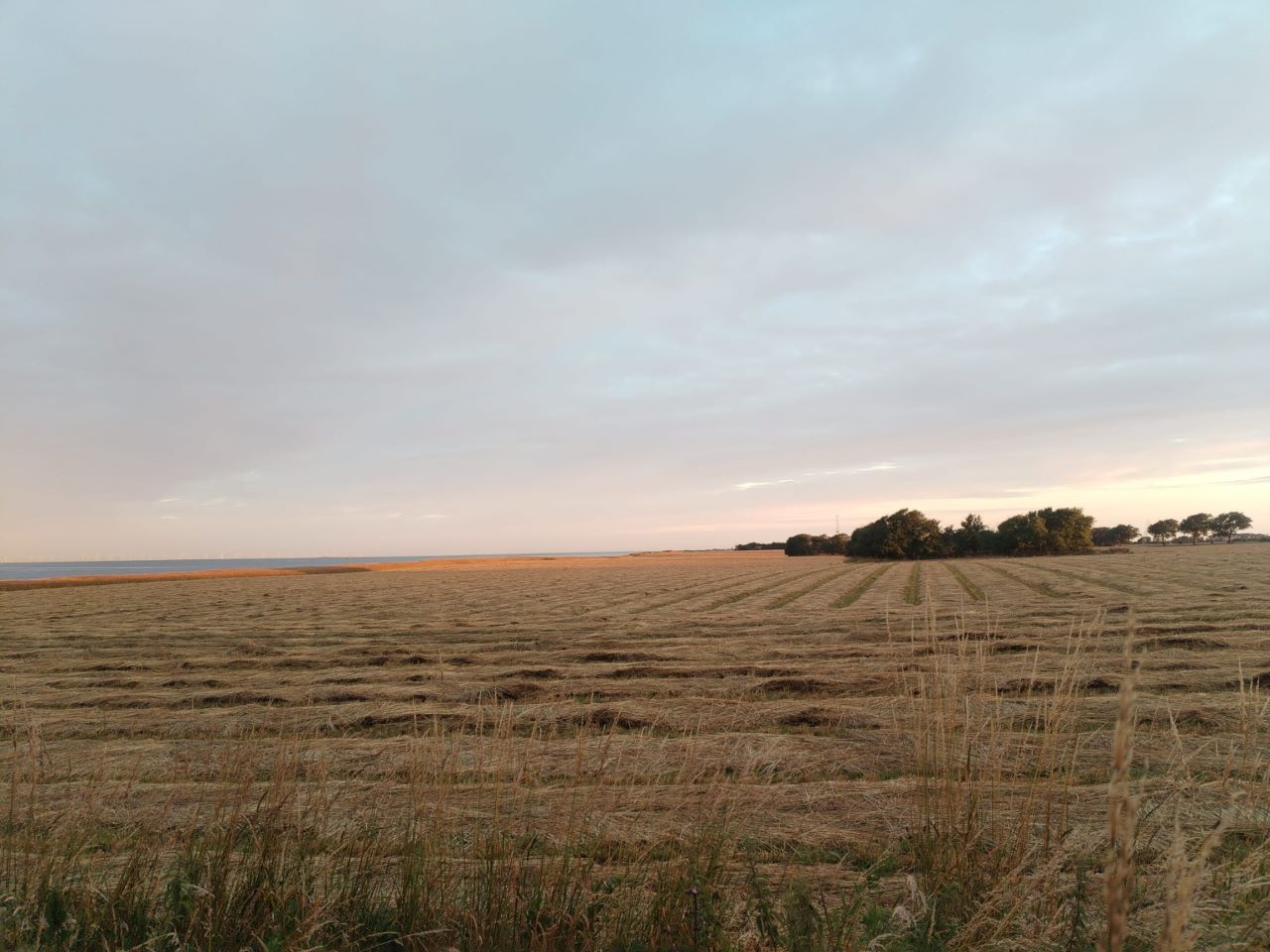 With the mowed field, it is easy to believe, that the autumn season is starting soon.
With the mowed field, it is easy to believe, that the autumn season is starting soon.
The ringing:
There was definitely a change in the garden today and yesterday. Species composition is getting different. While during real spring season, when I was here in May and June, it was mainly Icterine Warblers “Gulbug”, Lesser Whitethroats “Gærdesanger” Garden Warblers “Havesanger” and stationary breeders, mainly Linnets "Tornirisk", that we caught, but now, the F ring sheet is filling again. This is our smallest ring size, which the Chiffchaff “Gransanger” gets, and today again, it was mainly 1K Chiffchaffs “Gransanger”, that I had in the nets. In general, IKs are getting dominant. One and a half weeks ago, we already noticed quite a lot of Eiders ”Ederfugle”, that seemed on their way back to their wintering grounds. I have not been at the tip recently, the last days, just the garden and the house were my universe. But in the last mornings, I noticed a lot of Graylegs “Grågas” and flocks of Starlings “Stær” over the garden.
I am still hoping for a good day at the pond, before I leave, today and yesterday with the low winds, it was possible to have it open, but without success. On the way to check the once again empty pond nets, I noticed a Great Spotted Woodpecker “Stor Flagspætte” calling on top of a tree next to the high net. It is sitting a bit too high, I thought and continued my way around the pond and back to the garden. But I had the luck on my side, when I arrived at the high net, the Woodpecker was already there. So it was a quite nice morning with a little more and different birds in the nets than the days before.
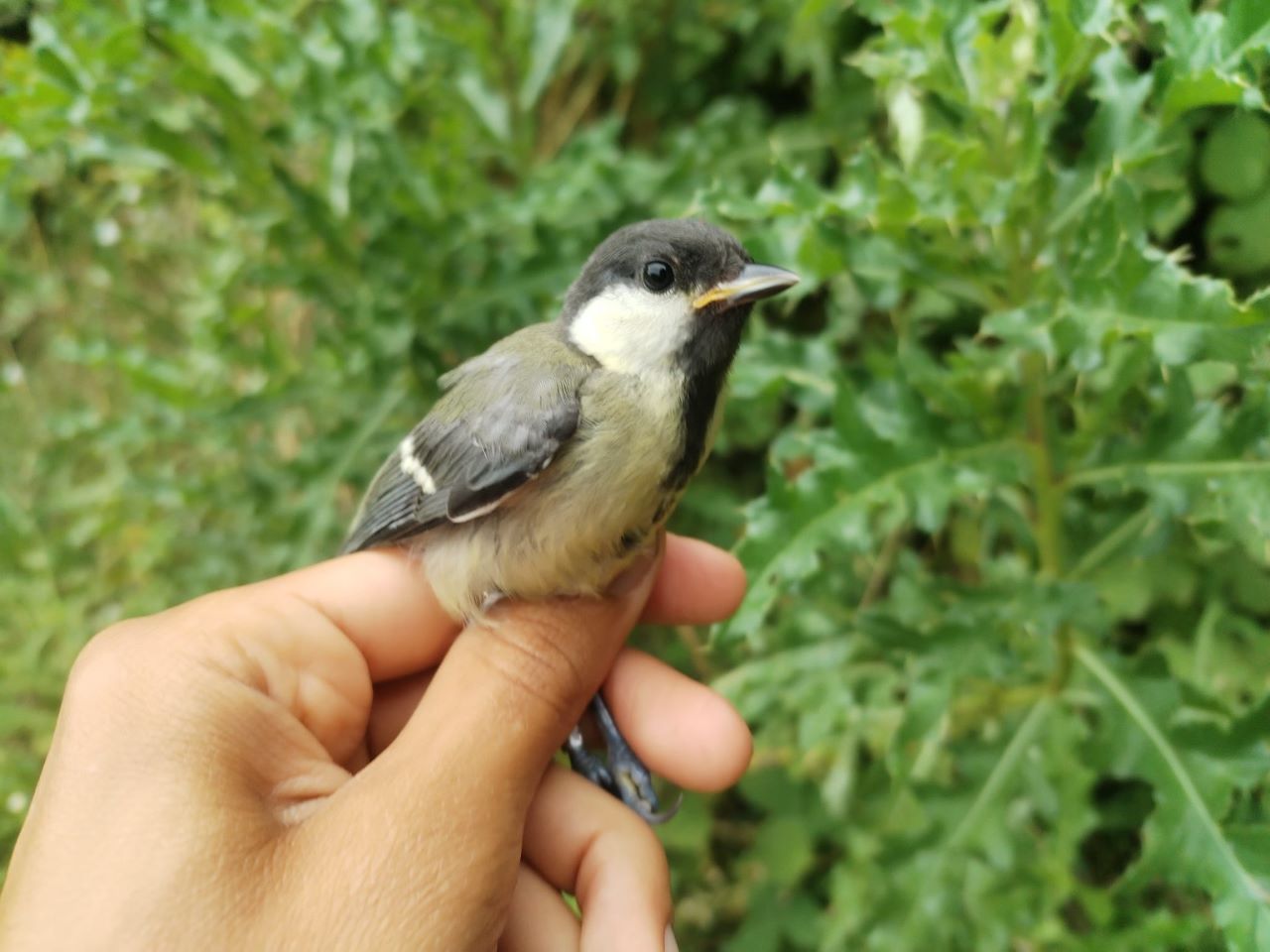 1K Great Tit "Musvit"
1K Great Tit "Musvit"
The moths:
Again, a night with low winds. Were there to expect as many moths as yesterday in the trap? When I went to the wall and opened the trap, I saw that it was not so many. To be honest, this was also not too bad, because I felt that it was really time to take a bit of rest, and there was no time for that yesterday and I still wanted to do the moth list (it is in yesterdays blog). There were still two new, rather common species, Nola cucullatella “Tjærne pukkelvinge” and Eilema lurieola “Blygrå lavspinder”, but I liked them.
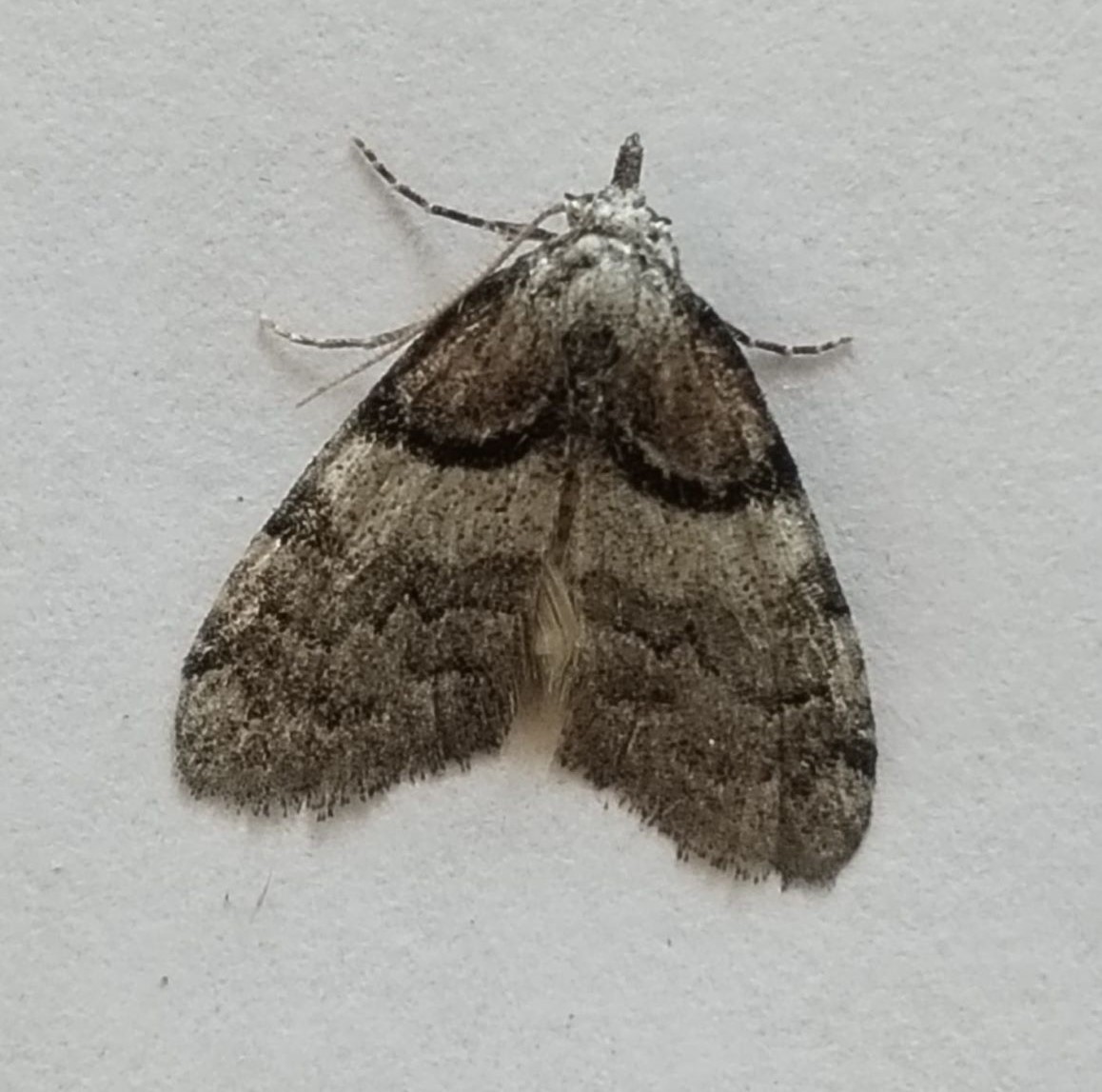 Nola cucullatella “Tjærne pukkelvinge”
Nola cucullatella “Tjærne pukkelvinge”
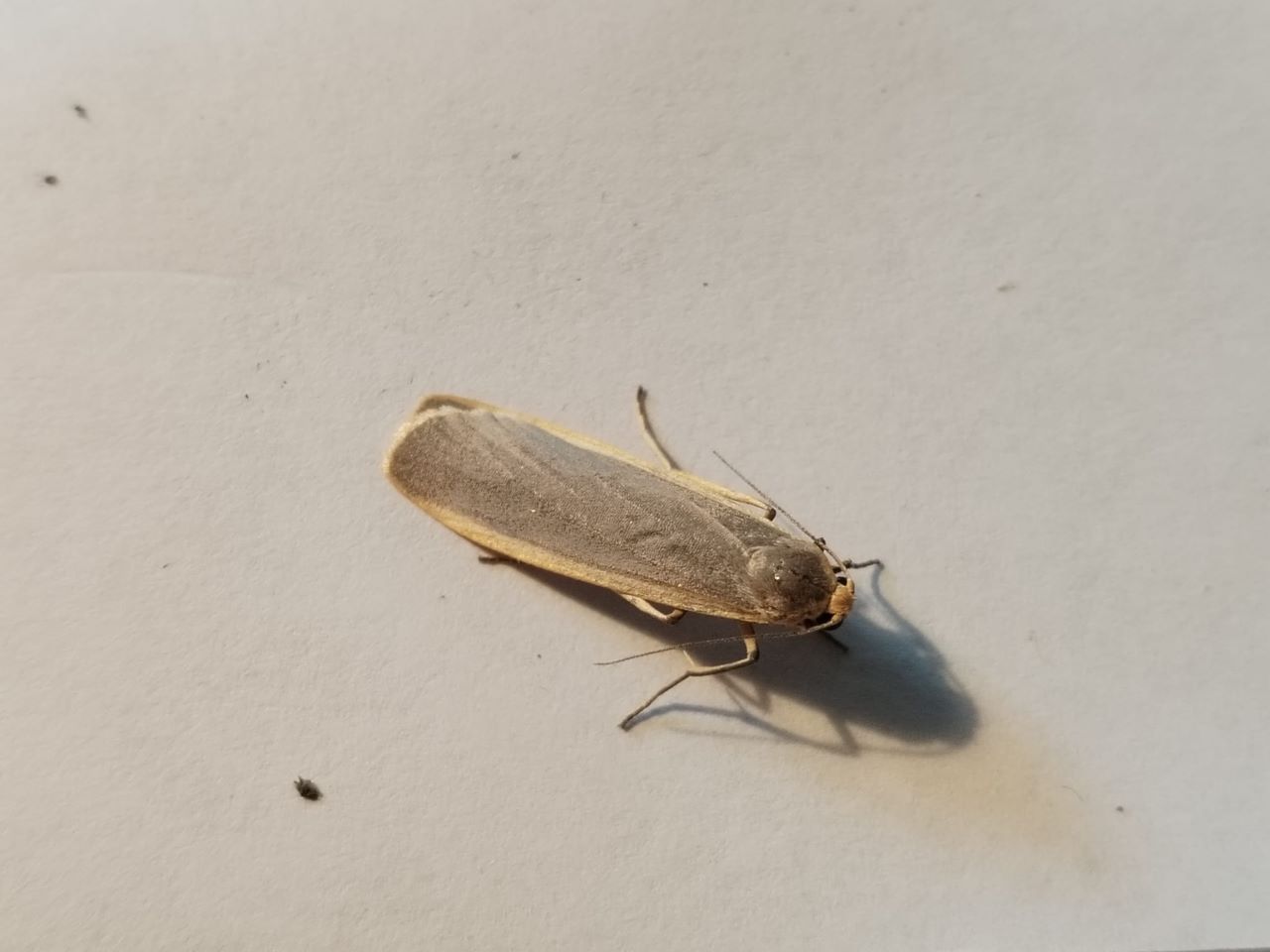 Eilema lurieola “Blygrå lavspinder”
Eilema lurieola “Blygrå lavspinder”
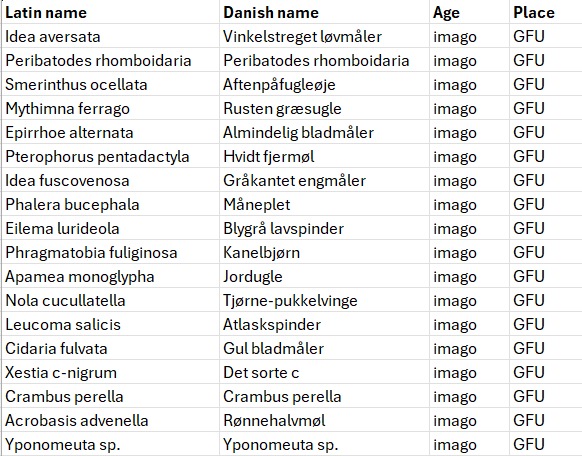
På stationen: Hanelie Sidhu and our guest Karen
Bird hatchlings on their way and an amazing night for moths
The ringing:
Ringing was just rather short this morning, as there was rain when I wanted to open and before closing time. Therefore, it was quite nice, as it was mainly 1K birds in the nets. The first young Chiffchaff that I had yesterday evening was followed by four more, there was a juvenile Sedge Warbler “Sivsanger”, a spotted juvenile Redstart “Rødstjert” and a juvenile Lesser Whitethroat “Gærdesanger” in the nets.
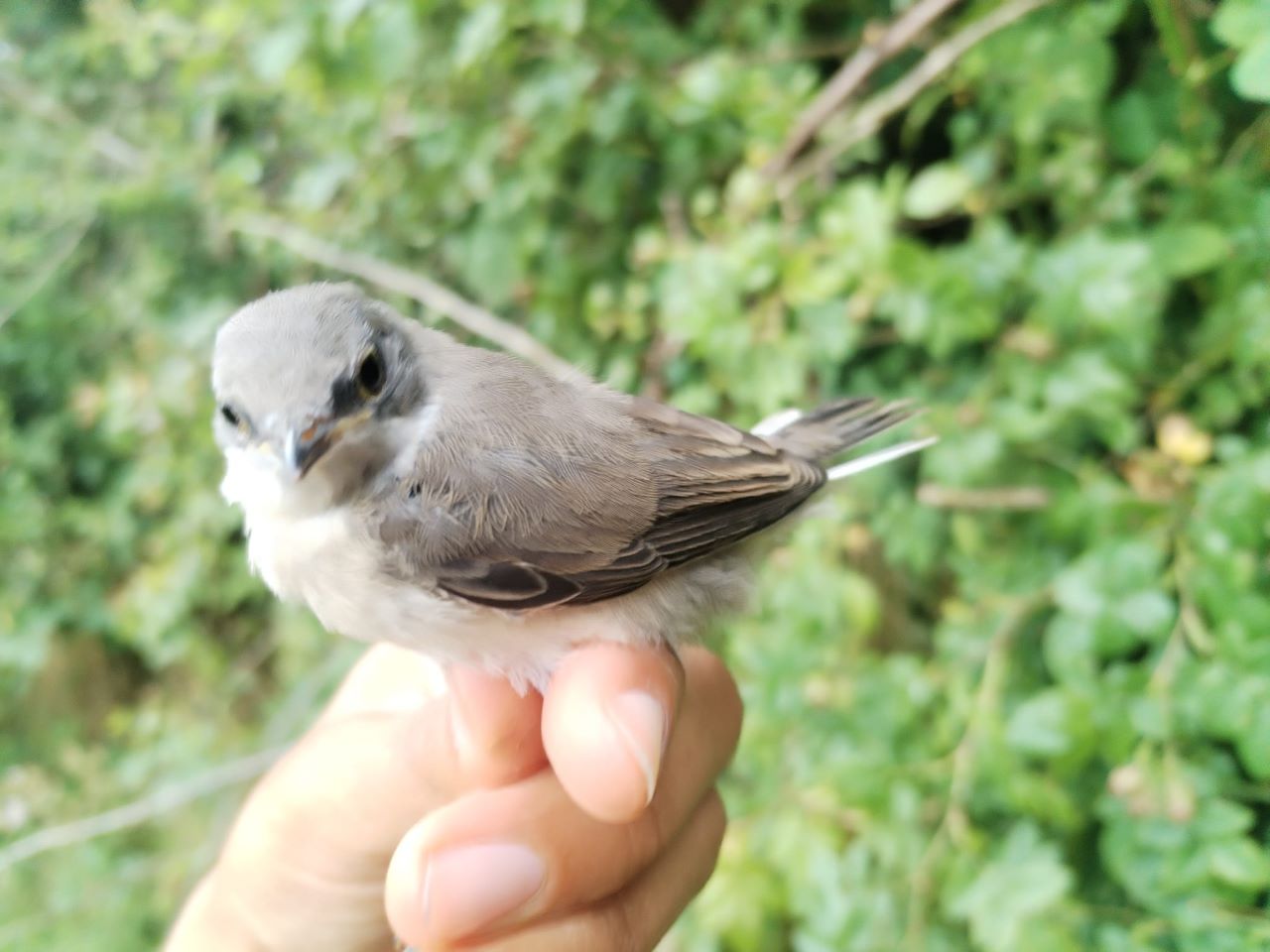 1K Lesser Whitethroat "Gærdesanger"
1K Lesser Whitethroat "Gærdesanger"
The moths:
I could have expected many moths this night, as there was no wind at all, but I was not expecting such a great number. First identified all species on the wall, which was already a lot. Then I had to go to the trap three times because I did not have enough jars to put them in. Very late in the afternoon, finally all jars were emptied and all moth identified. I had quite some new and very nice species today. On the statistic of the ObsIdentify app, it showed me, that I had 47 moths species today! To complete my luck, Hans brought me Aedia funesta “Særgesnerugle” to the station today, that he had caught in his garden today. It was a long day, and I am quite tired. Please find this blog updated with the moth list tomorrow. I will just put in pictures of some nice species I had today.
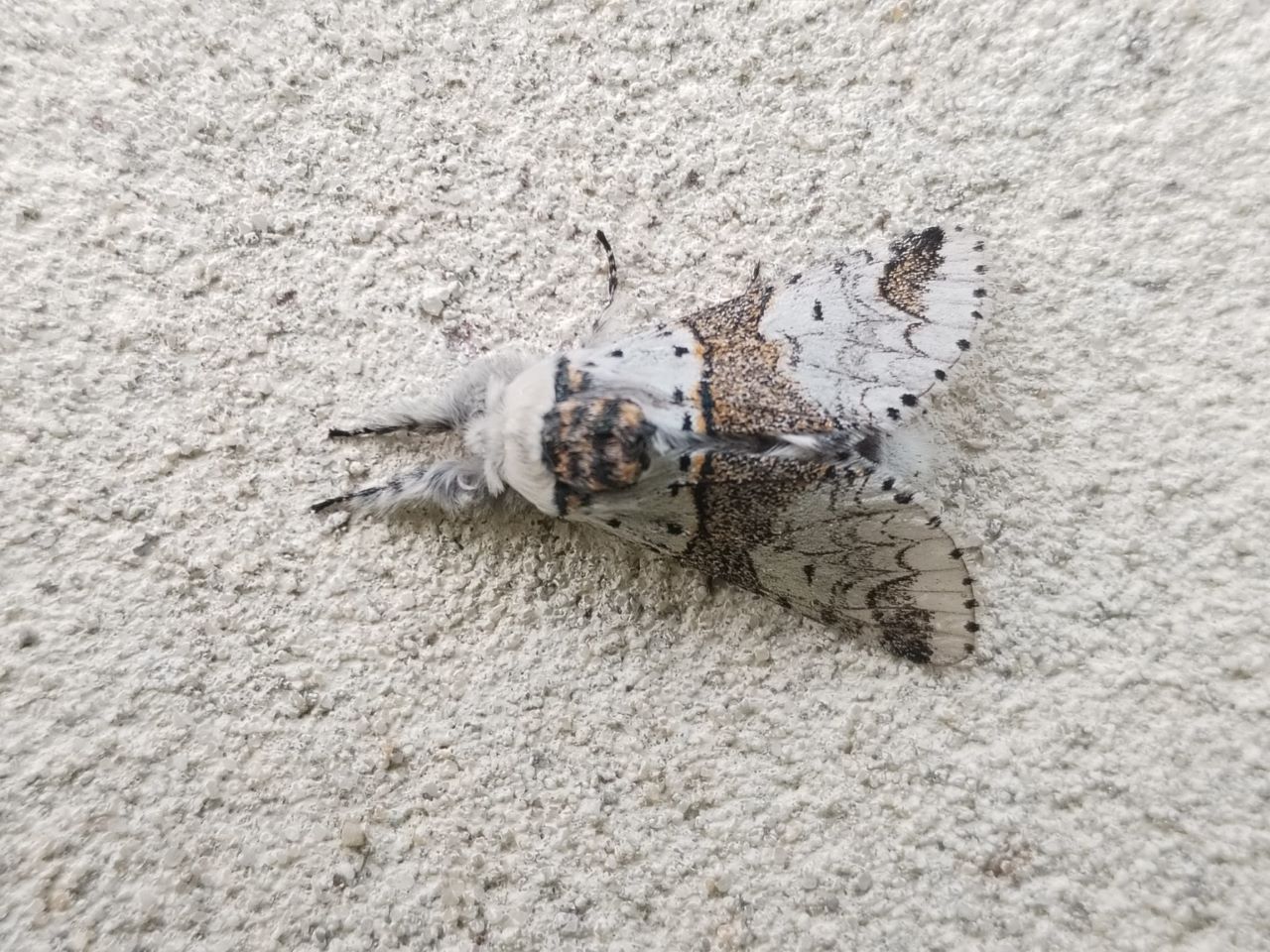 Furcula furcula "Pilegaffelhale"
Furcula furcula "Pilegaffelhale"
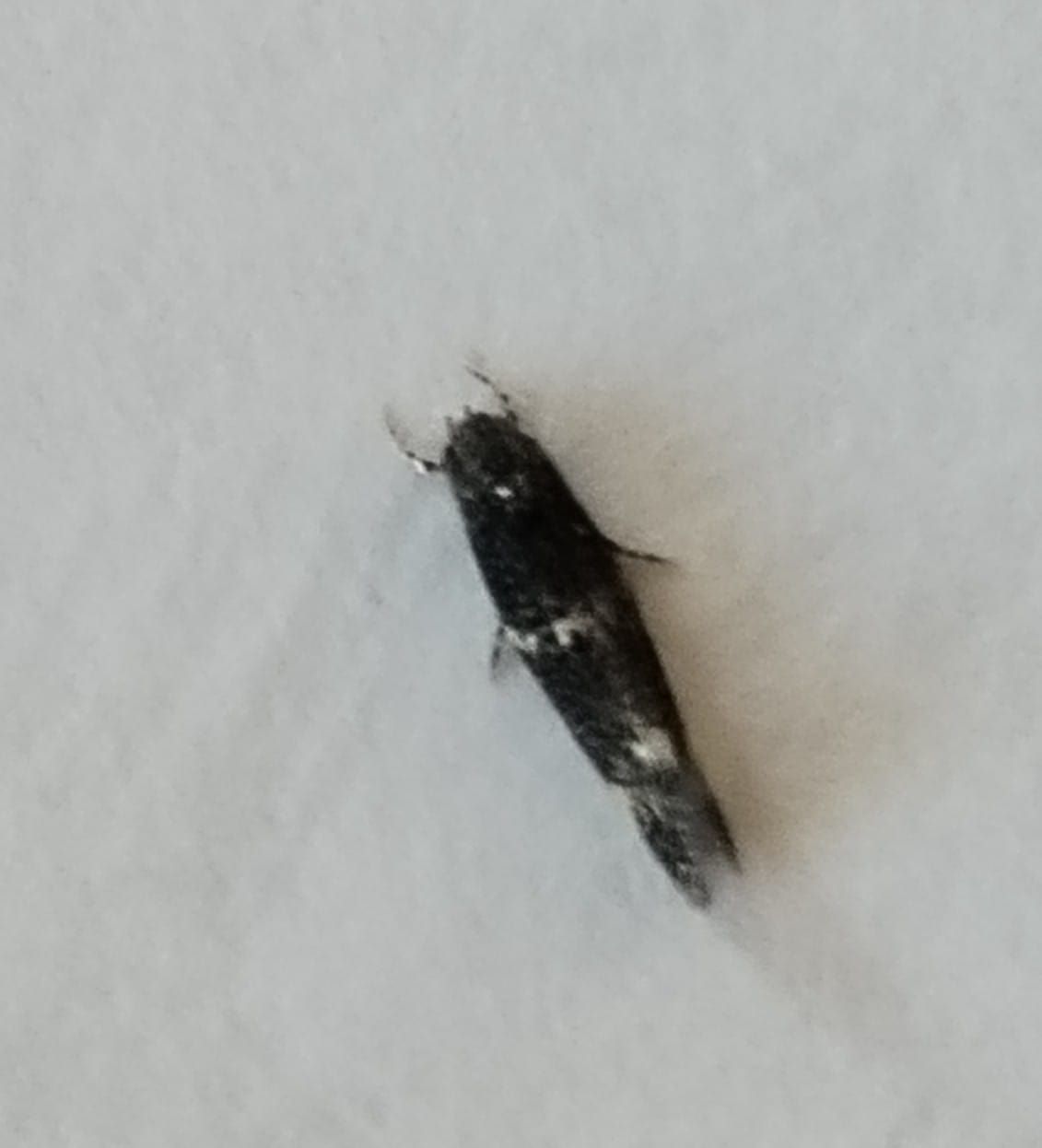 Elachista atricomella
Elachista atricomella
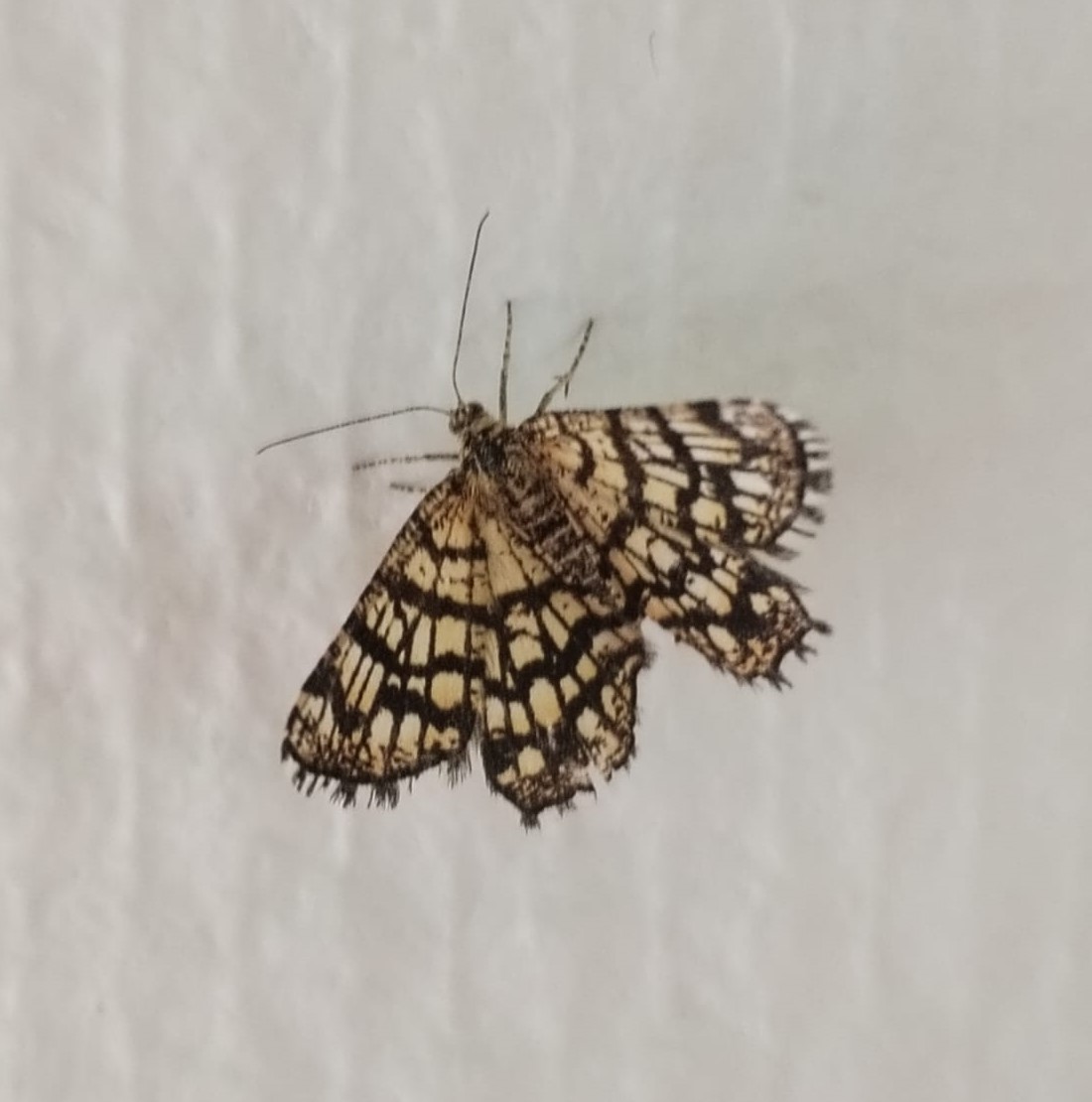 Chiasmia clathrata "Kløvermåler"
Chiasmia clathrata "Kløvermåler"
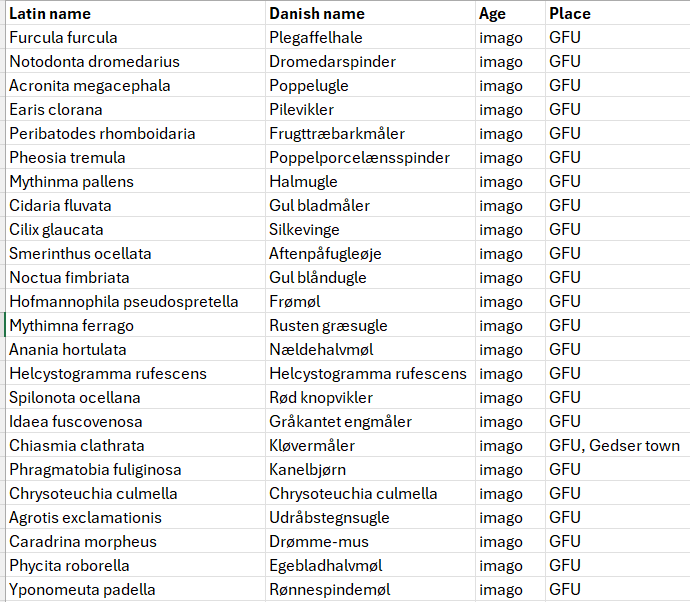
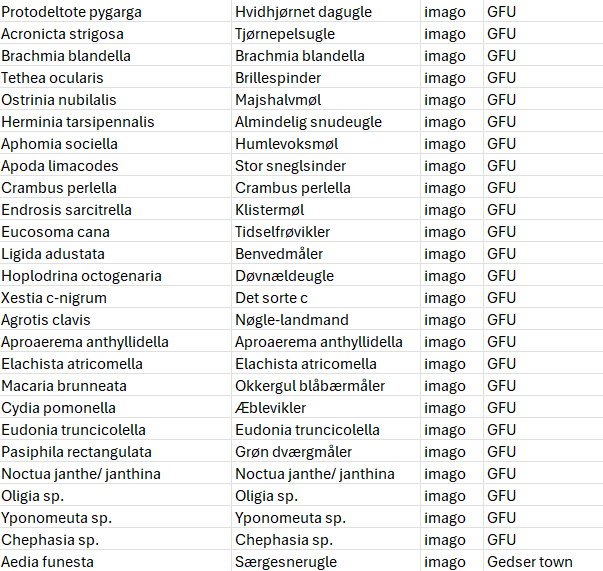
På stationen: Hans Lind, Hanelie Sidhu
Evening ringing
After the little thunderstorm yesterday evening, the wind really picked up. I stayed up long and just before the last light was gone, I went out in the garden and to the pond, to check, if the wind did not open one of the nets. They were all fine, I had done the closing job well, but just to be safe, I used some pegs to secure them. When my alarm woke me up early in the next morning, I stepped out of the house, but the wind had not slowed down at all. That meant, I could sleep a bit longer before checking the moth trap and after, I used the time to learn for the university exam, I will have at home. I was quite productive but at some point, it was really time for a pause and I happily noticed, that the wind had slowed down a lot, so I went out to open the nets in the late afternoon. Outside, it had 25 degrees, I was a bit surprised and did not like it so much, that the lab seemed to have turned into a sauna. Now it is cooling down a bit and I am writing the blog between the rounds, so far just recaps. But to avoid it getting too late, I will not write more about the ringing, but just add the totals later.
The ringing:
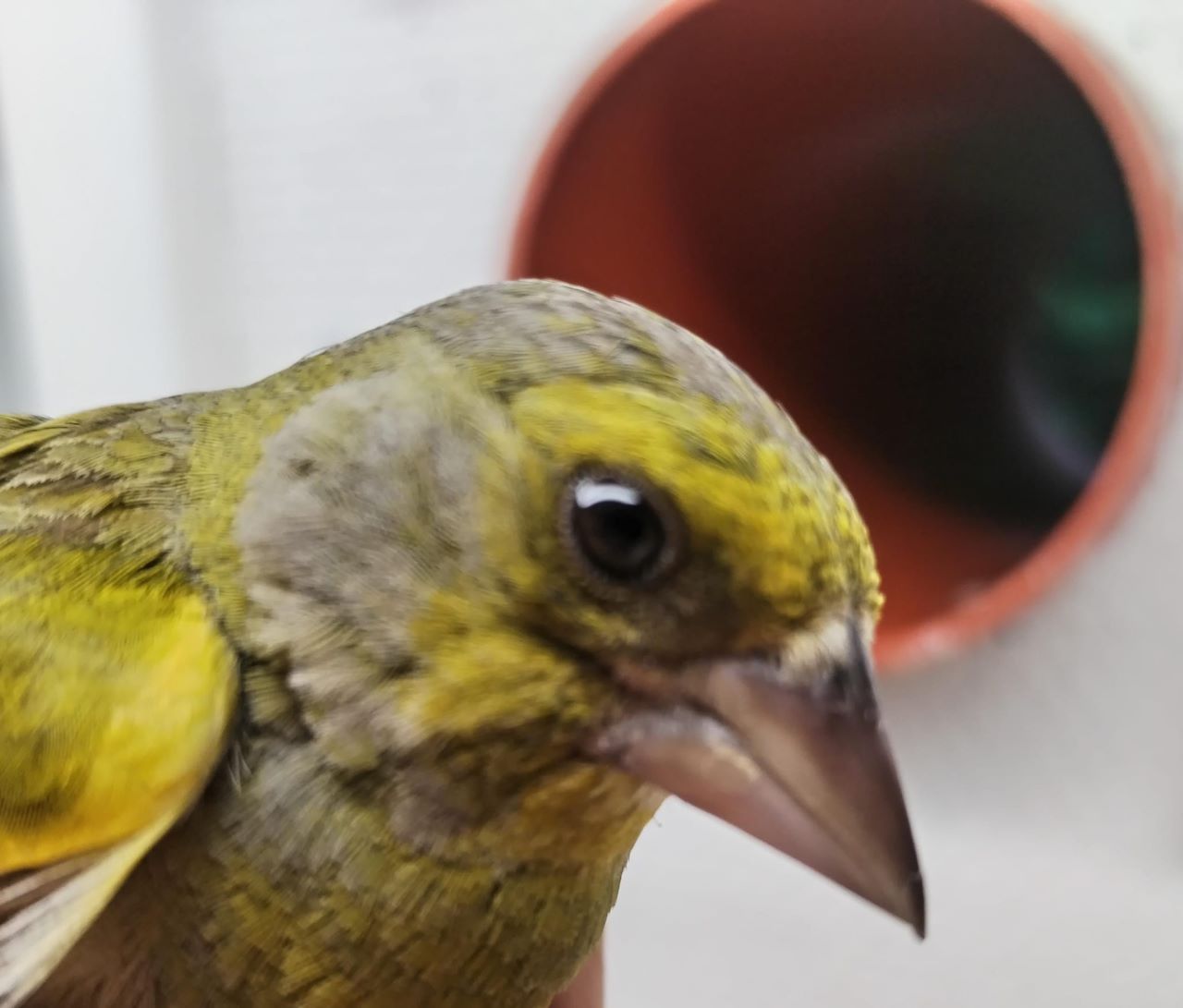
Greenfinch "Grønirisk" just before beeing released out of the lab
The moths:
Which moths will fly in that weather, I thought on my round through the garden yesterday in the late evening. But whatever, maybe I would show them a sheltered place with the light. Indeed, there were not many species, but one that is not new, but a very nice one, Herminia grisealis "Grå-snudeugle". I will show it to you, I think the colour in combination with the pattern on the wings is really pretty.
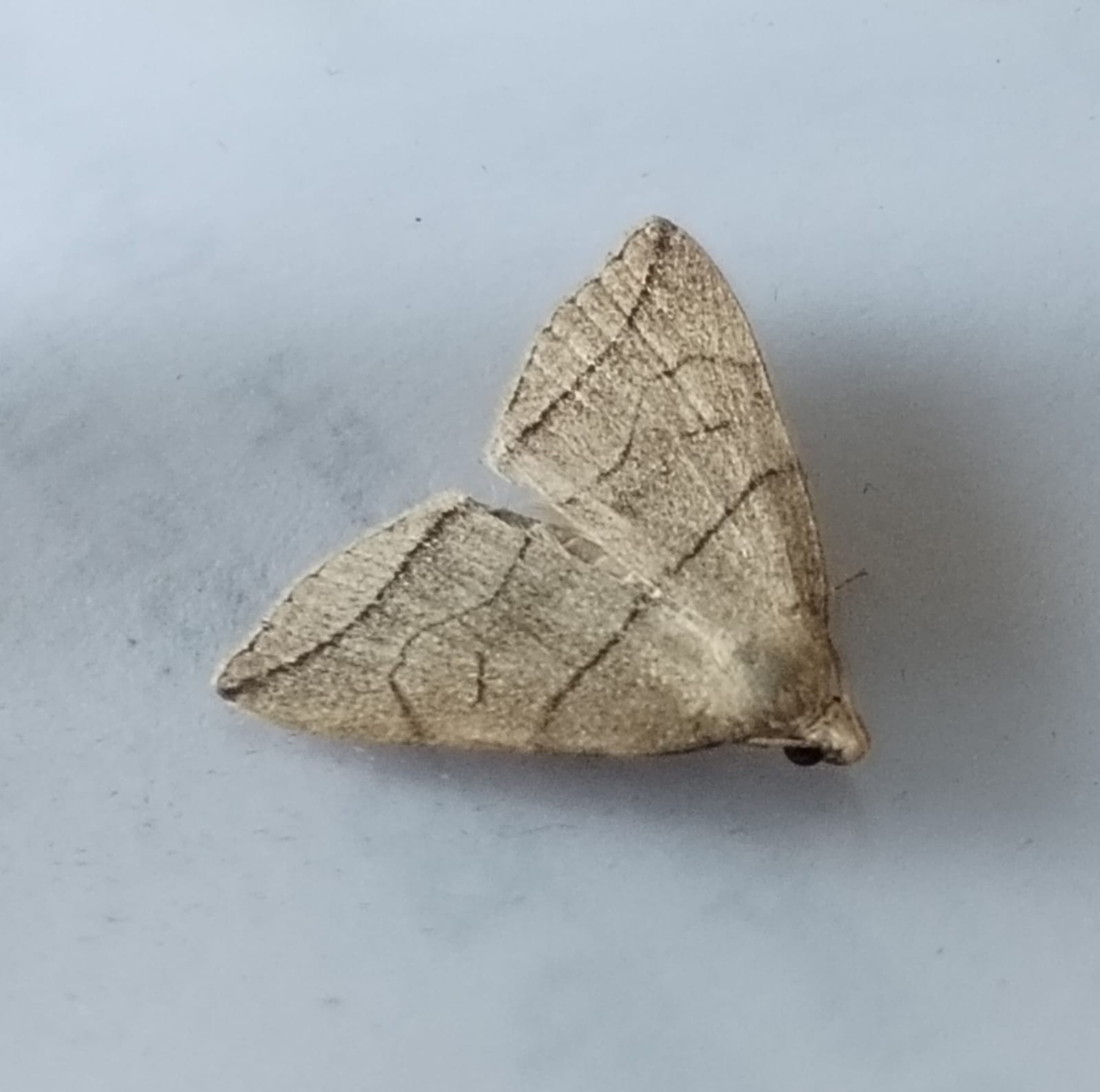 Herminia grisealis "Grå-snudeugle"
Herminia grisealis "Grå-snudeugle"
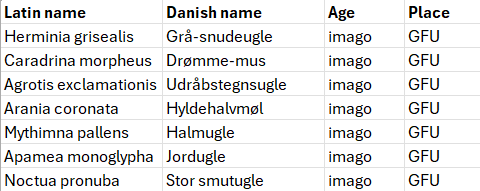
Not a moth, but Hans had a new garden species today: In the afternoon, he got a visit of Papilo machaon “Svalehale” in his garden!
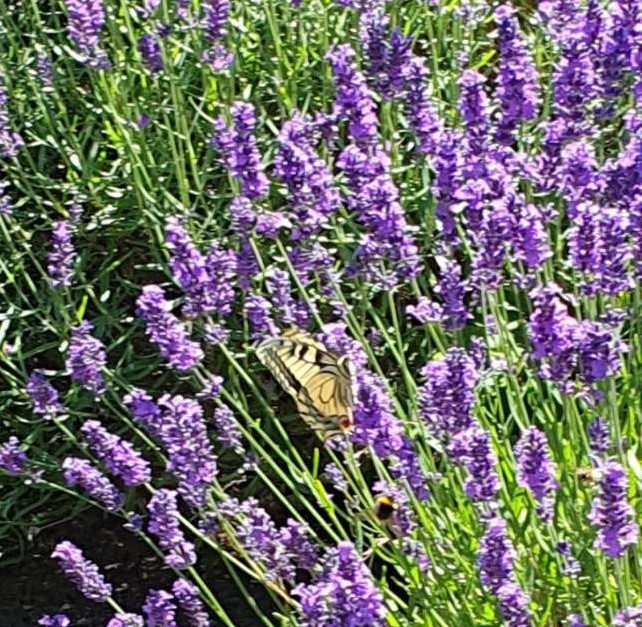
På stationen: Hanelie Sidhu
A first calendar year Robin "Rødhals"
The ringing:
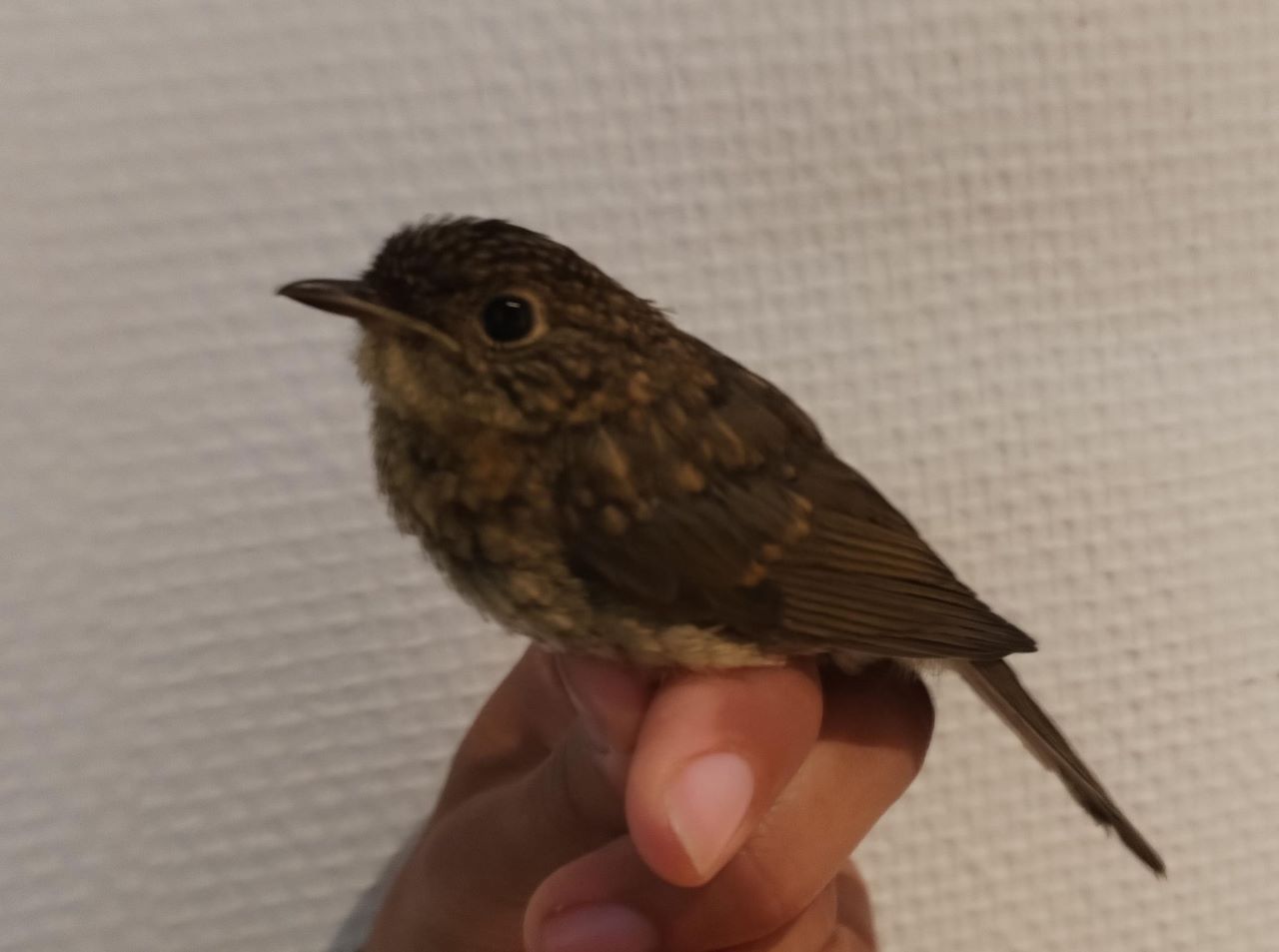
This mornings first calendar year Robin "Rødhals"
This time of the year is definitely not the most exiting or challenging. The garden is rather quiet, most birds are occupied with eighter still breeding but mostly hatching their young. But this is the special thing about that time of year: Every day, the freshly hatched bird of a new species can land in the net. Today, it was time again, I took the first first calendar year Robin “Rødhals” out of the net in the first round. When I approached the net, I saw another bird coming close to the net and calling, probably a parent that was worried about its hatchling. I extracted the bird from the net, it got a ring on and measured and soon, it was released, close to the net where I took it out, so it could easily find its parents again. In another net, I found today two Common Whitethroats “Tornsanger” next to each other, a young bird and an adult, probably the mother with its hatchling. Else not so many birds today, six new and 4 recaps, but I had some moth to look at.
The moths:
Atthough, I must say, it was probably the least interesting arrangement of moth species today. Mythimna pallens “Halmugle and Apamea monoglypha “Jordugle” were very abundant while I didn´t have many other species today. But nature is not a request programme and this is just a good thing.
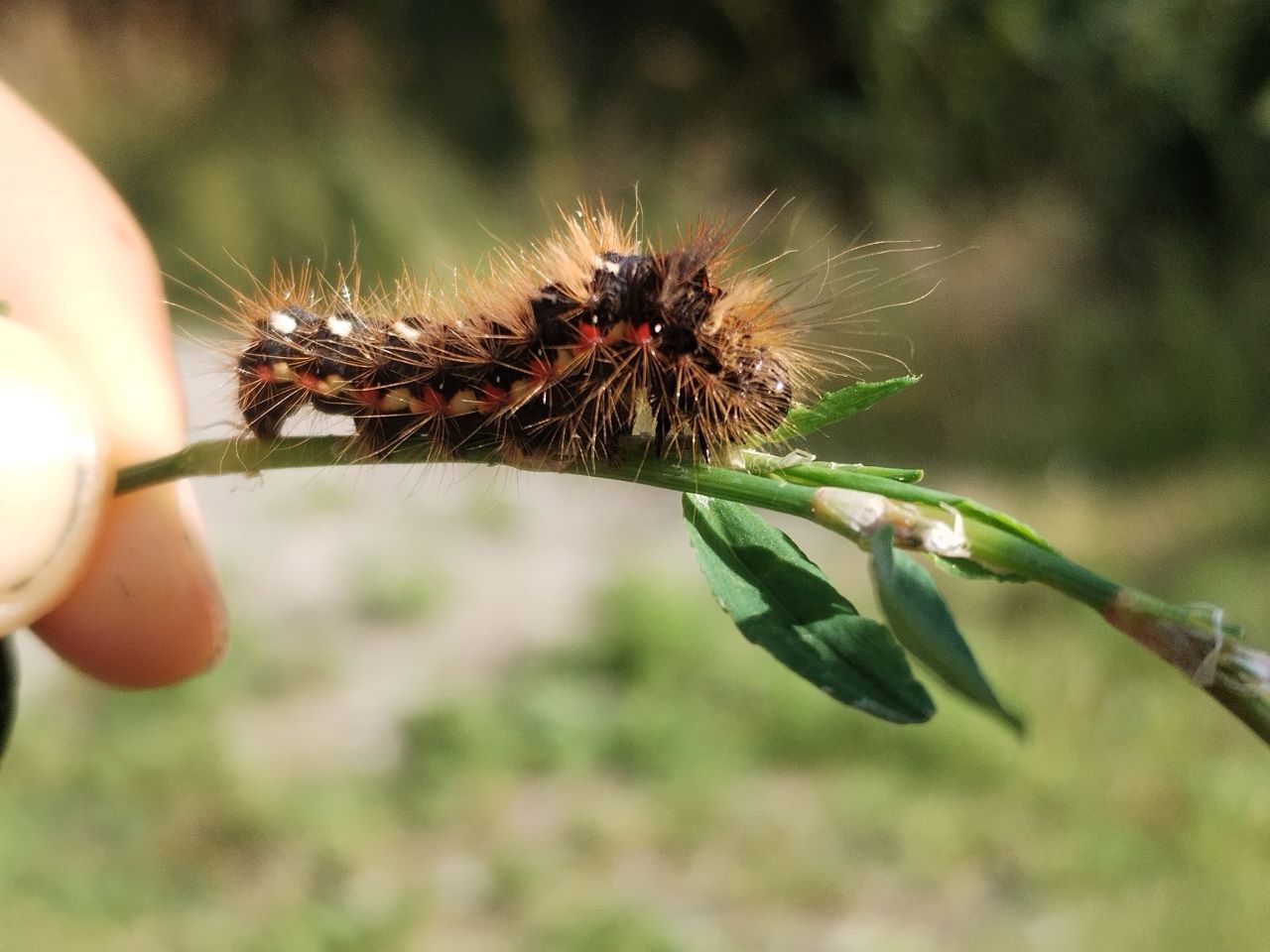
Not in the trap but an interesting finding behind the house: The larvae of Acronicta rumicis "Syreugle"
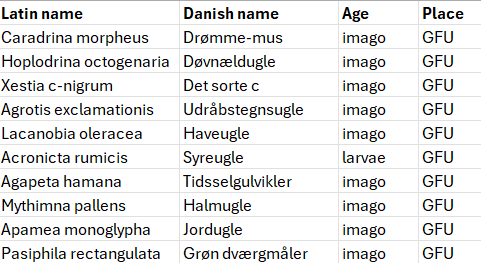
News of the station:
In the morning, Anne-Marie came shortly to the station to bring some purchases for the house to the station. Since the late morning, I am observing a first calendar year Black Redstart “Husrødstjert” jumping and flying around the house. It especially likes the stairs going up to the attic, but also landed on the window still of the meeting room. Just now, there was a heavy rain shower with thunder and lightning. While the Black Redstart “Husrødstjert” shook itself, bobbed its tail and flew and jumped around under and on the stairs outside, however, the hare did not seem impressed at all and continued nibbling the grass close to the house. Now the storm is over and they both left the sheltered place. I am sure I will meet them again tomorrow. On the forecast it says very strong wind, so let´s see, if it will be possible to open some nets…
På stationen: Anne-Marie Raith, Hanelie Sidhu
